

WSJ leaves Hillsdale out of college rankings
By Ellie Fromm News Editor
The Wall Street Journal
continued a years-long habit of excluding Hillsdale College from its college rankings this year because it does not participate in federal student aid programs, according to a spokesperson for the Wall Street Journal College Rankings.
“Being left out of the Wall Street Journal rankings is an ongoing thing, and it’s not because they are out to get us, in my opinion, or anything like that,” Hillsdale College’s Director of Institutional Research Joshua Trojniak said. “It’s a question of data availability and methodology.”
The Wall Street Journal analyzed research in partnership with the College Pulse and Statista, weighting different components as they see fit, with “student outcomes” beginning weighed at 70%, “learning environment”
weighed at 20%, and “diversity” weighed at 10%, according to the Journal’s website.
“Hillsdale College does not participate in Title IV federal student aid programs, which is one of the eligibility criteria to be included in the ranking,” the report’s spokesperson said.
The top 10 “2025 Best Colleges in the U.S.” are Princeton University, Babson College, Stanford University, Yale University, Claremont McKenna College, Massachusetts Institute of Technology, Harvard University, the University of California Berkeley, Georgia Institute of Technology’s main campus, and Davidson College, according to the Journal.
The Princeton Review ranked Hillsdale earlier this year as No. 2 in “Most Engaged in Community Service,” “Most Politically Conservative Students,” and “Most Religious Students.”
See Rankings A2
City removes Camp Hope structure
By Moira Gleason Executive Editor
Homeless residents watched as city workers pulled down the tent structure at Camp Hope Oct. 16, some sitting on beds and furniture inside the tent in protest until the last few moments.
The Hillsdale City Council voted 5-3 at its Oct. 6 meeting to remove the structure. The council deemed the current tent structure unsafe for occupancy and cited concerns over zoning compliance, public safety, and the camp’s indefinite status. Residents moved out of the tent Oct. 15, according to Camp Hope founder Melissa “Missy” DesJardin, and the demolition team showed up the next morning at 8 a.m.
DesJardin filed an application including site plans for the new transitional living facility HOPE Harbor with the Hillsdale Planning Commission Oct. 14. The HOPE Harbor project — which stands for

Hillsdale Opportunity Promoting Empowerment — aims to convert the storage building behind Hillsdale Community Thrift into a sober transitional housing facility.
The tent demolition would have been joyful if it had happened when HOPE Harbor was already up and running, according to Keri Stewart, president of the board of directors for HOPE Harbor.
Furloughed ‘WHIP’ students now on ‘WHP’
By Faith Miller Collegian Reporter
Six Hillsdale students completing the Washington Hillsdale Internship Program are non-essential — ac cording to Congress at least.
All non-essential government employees have been furloughed since Oct. 1 because Congress did not meet the deadline to pass appro priations legislation for the 2026 fis cal year. Most federal employees will receive no pay until after the govern ment reopens.
Although they are not working the jobs they were hired to do, students who were working “on the hill” are in stead spending their time off working on a college research project — and ex ploring on the side.
“We’re not allowed to be in contact with our supervisors at our office. We are doing nothing for our internships right now, and it’s been that way for two weeks,” said junior Gabriella Lovins, a furloughed federal intern. “The day before the gov ernment shut down, all of the interns were called into a meeting and told if the government shuts down, you will not be permitted to come into work, and you will not be able to contact your supervisors.”
By Thomas McKenna Editor-In-Chief
Forty-eight years. That’s how long Lisa Slade worked at the Finish Line Family Restaurant before retiring earlier this month.
After starting as a waitress during high school in 1977, Slade took over the diner in 1995. Her life’s work at the Hillsdale diner reached the checkered flag this year, when she sold the restaurant to local business executive Gavin Carr in July. “I was just flat-out getting
Hillsdale in D.C. has been providing work for the furloughed students,

abeth Soeleman, an intern at the House of Representatives for congresswoman Young Kim.
“We’ve been just doing work for the school over here, specifically, the D.C.
tired,” said Slade, who turned 65 in February. “I love what I
campus, just kind of little projects here and there,” Soeleman said. “I think it’s really cool to get really connected to the D.C. campus over here while I’m on WHIP, and obviously I wouldn’t have been able to have done that if I continued my internship.”
Although the unemployed interns currently cannot work their internships, they have kept busy, according to junior Alex Mooney, a federal intern.
“There have actually been a lot of opportunities. I’ve been surprised. There’s tons of stuff to do in D.C. normally, but we’ve gone to several events at different think tanks and nonprofits,” Mooney said. “Some of them have ramped up or had specific events for furloughed interns or furloughed staff. So we’ve gone to some of those.”
The students have been able to take advantage of opportunities they wouldn’t otherwise have time for if they were still working their internships, according to Soeleman.
staying in the Finish Line family. Carr is the older brother of
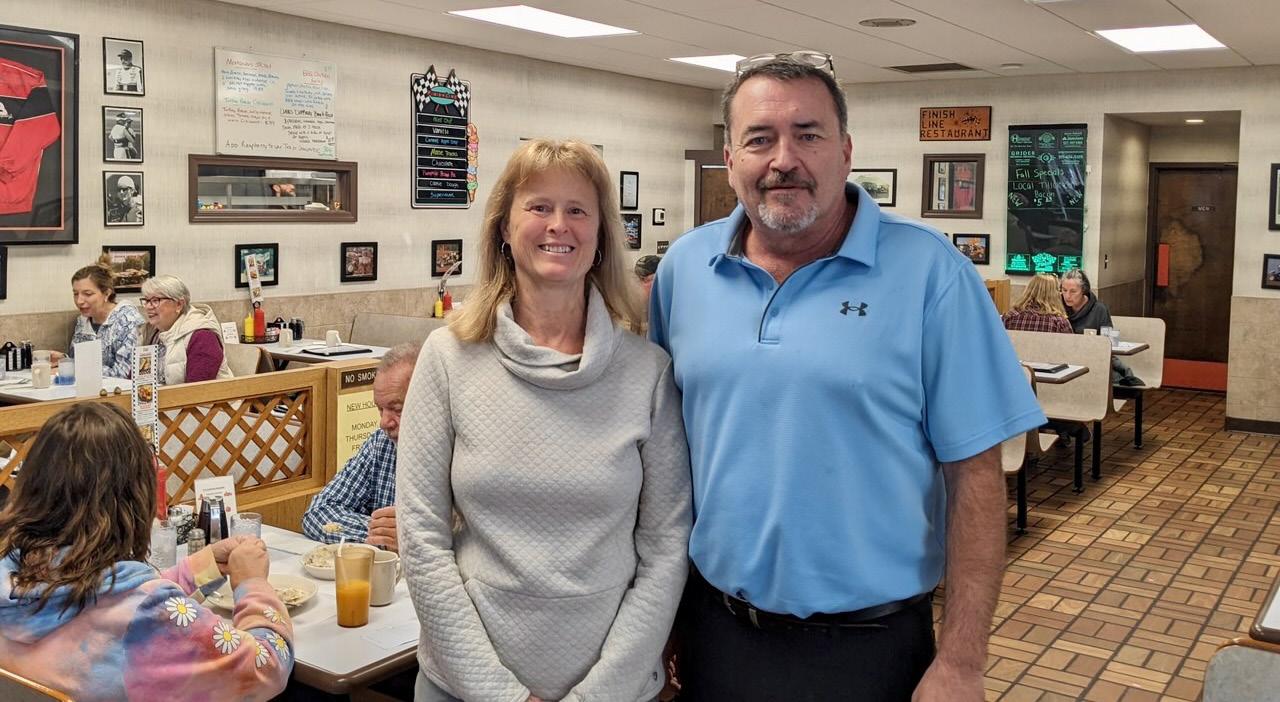
do, but my body was saying, ‘That’s enough.’” But the Hillsdale diner is
During a pause in her shift last Friday morning, Bonner sat next to Slade at a back table in the diner and recounted how she told her brother last winter that Finish Line was for sale.
“Well, he was looking for something else to do, talking about restaurants and stuff,” Bonner said. “I said, ‘Finish Line’s for sale,’ thinking it wouldn’t go anywhere from there. He was just curious.”
Carr called the diner. Bonner picked up.
“This would have been something to be celebrated,” Stewart said, as pink insulation blew across the lot behind Hillsdale Community Thrift and workers pulled apart the metal frame of the tent that housed 16 residents until last week.
Ward 4 Councilman Robert Socha voted in favor of removing the tent structure.
“I think Missy’s efforts are
to be praised, but the original agreement was that this was just going to be a temporary thing — six or seven months, and in the spring of 2024, it would be gone,” Socha told The Collegian last week. “But here we are, 2 1/2 years later, and it’s the same. At some point, you have to enforce the law.”
See HOPE A7
‘Please come back’:
The pizza resturant will cater El Clasico this weekend
By Eleanor DeGoffau Senior Reporter
St. Joe’s Cafe served pizza in the dining hall for lunch on Oct. 16 and will be returning to campus to cater at “El Clasico,” the protestant-Cath-

olic intramural soccer game in Hayden Park, for a meal swipe, on Oct. 25. Metz Culinary Management expects the events to be the beginning of a partnership with the local pizzeria, as Metz explores more ways to bring variety into the dining hall, according to Todd Gerry, general manager of Hillsdale College Dining. “Our pizzas are great, but it’s just nice to, every once in a while, have something different and spark some fun,” Gerry said.
don’t usually
in Saga
Joe’s Cafe is a European-style cafe in downtown Hillsdale that features a small menu with quality items, including artisan 12” and Detroit-style pizzas made without seed oils. On Thursday, the cafe served Detroit-style pizza with toppings such as cheese, pepperoni, sausage and prosciutto, and arugula. It opened in October 2024. Senior Jihye Kim said she appreciated both the flavor and the healthiness of St. Joe’s Pizza on Thursday.
Michigan’s oldest college newspaper
waitress Krysta Bonner, who has worked at the restaurant since 1993.
Finish Line’s previous owner, Lisa Slade, and new owner, Gavin Carr. Thomas McKenna | The Collegian
Freshman Dylan DeDario serves himself St. Joe’s pizza during lunch on Oct. 16. Moira Gleason | The Collegian
Junior Katherine Reyes and senior Tayte Christensen in DC. TayTe ChrisTensen | The Collegian
City workers remove Camp Hope on Oct. 16. Moira Gleason | The Collegian
Alumna takes control of Hillsdale in DC undergrad program

By Tayte Christensen D.C. Correspondent
Dottie Roland ’25 started as the Washington Hillsdale Internship Program undergraduate coordinator for Hillsdale’s Washington, D.C., campus this fall.
Roland takes the place of former WHIP coordinator Mary Wheeler, who stepped into a part-time role with the D.C. campus in the spring. Roland said it was Wheeler’s nudging that prompted her to apply for the job.
“I had not really considered D.C. for post-grad. I was pretty set on moving back home to Omaha, Nebraska,” Roland said. “I was going to work in a law firm, and had that all laid out. Then Mary sent me this message like ‘I really want to encourage you to apply.’ So I said, ‘OK, Mary, I trusted you when you said I needed to go on WHIP, I trusted you when you said I needed to work on the Hill, and now I trust you that this could be good for me.’”
As a student, Roland was a rhetoric and media major and
economics minor, a member of Chi Omega sorority, and volunteered for A Few Good Men. She also worked for the athletic department and was a fellow for the Center of Commerce of Freedom in the economics department.
Roland, who participated in WHIP the fall semester of her junior year, officially started her role with the college in June and spent the summer preparing programming for the fall semester. But Roland said it was difficult to get a big-picture understanding of the job before students arrived in August.
“It was a little hard to see my purpose on my team without the undergrads,” Roland said. “But once everyone got to campus, it was very easy to see how fun and how meaningful my work could be.”
When encouraging Roland to apply for the role, Wheeler, who now serves as Hillsdale in D.C.’s digital communications coordinator but was the WHIP coordinator when Roland was a student, said she knew Roland’s poise and professionalism would suit her well.
“I remember talking to her internship supervisor and he said he would hire her in a heartbeat,” Wheeler said. “That, of course, stands out because it means that she made such a good impression on her coworkers and on her superiors.”
Wheeler said Roland has the bright personality to succeed in the position, which requires communicating with a range of people — from current and future WHIP students to the Hillsdale in D.C. team.
“I knew her reputation on campus was so strong and she’s so personable and everybody loved her, so I thought
that would be a really good aspect of it that she’s already got strong friendships at Hillsdale and a good reputation,” Wheeler said.
Roland said that the role of WHIP coordinator is multi-faceted, with recruiting students on main campus as one element of the job while also balancing planning programming for the current WHIP class. Roland said this includes formal dinners with Dean of the Van Andel Graduate School of Government Matthew Spalding and visiting historical sites such as Mount Vernon and Gettysburg.
The role also entails ensuring students are thriving in their internships and are managing classes well, Roland said.
“We want to make sure that their limited time in D.C. — that one semester — goes as smoothly and is as enjoyable for them as it possibly can,” Roland said. “We want to make sure that they are being challenged, and to make sure we’re seeing that growth we’ve promised.”
Wheeler said in her experience, the first weeks of the semester can be the most difficult, as the role requires onboarding students in D.C. while traveling to main campus for recruitment events. But, Wheeler said, Roland has handled the busyness with the same composure she brings to the Hillsdale in D.C. team.
“She’s got a very calming presence about her which I think is really good especially in D.C. because a lot of times we’re doing so much all at once,” Wheeler said. “It’s nice when people are stressed or have a lot going on to have that calming presence that Dottie brings.”
Junior Ellie Soeleman, a
current WHIP student, said she and Roland were in Chi Omega at the time when Roland found out she would be taking over the job.
“I was really, really excited for her,” Soeleman said. “I was already accepted into WHIP at the time, so knowing that we would both start this together was really cute.”
Soeleman said Roland has given this semester’s WHIP class new and unique experiences, such as attending a performance of “The Lion, the Witch and the Wardrobe” at the Museum of the Bible and a D.C. United soccer game.
“She’s been so awesome,” Soeleman said. “Seeing her transition from an undergrad student to a director position has been so seamless, and she handles it so well.”
With only a year or two separating Roland and most WHIP students, Roland said it can be difficult to balance the dichotomy of being a former student-turned-authority figure. But junior Elizabeth Gaines said she admires how Roland has handled the transition.
“I’ve really appreciated how Dottie balances being a friend and mentor to us while
running the program,” Gaines said. “She has been a great guide through the process of getting an internship and getting settled in the city.”
In her time as WHIP coordinator moving forward, Roland said she wants to expand the program both in number of students and in types of courses offered.
Ongoing construction on the Kirby Center, which Roland said is expected to finish soon, will expand the college’s reach in D.C., including the number of graduate and undergraduate students the college can hold, as well as the types of courses that the campus can provide.
“The campus was already beautiful to begin with, but now it is truly feeling like an extension of the home campus in Hillsdale,” Roland said. “With that, we want the Hillsdale in D.C. campus to reflect a larger and more diverse undergraduate presence.”
Some changes will start next semester, Roland said, with the campus adding an additional journalism credit with Mark Hemingway, journalist and senior writer at RealClearInvestigations, and a new politics course meant
to reflect the rigor of a law school class.
Roland said her hope is that the campus will appeal to students from all over campus — from classical education minors to STEM students.
“That means it’s not just for your politics majors and your journalism minors,” Roland said. “Yes, those people have the greatest need and want and desire for a WHIP semester, but we want all of campus to know that D.C. is a campus where there is something for you.”
Since she started the role, Roland said the Hillsdale in D.C. team has been nothing but supportive of her goals for the program moving forward.
“The kind of faith that they so quickly placed in me was just so reassuring,” Roland said. “This is a great place to start a career post-grad, working under an institution that I greatly admire, have a lot of respect for, but also am able to teach other undergrads about the self governance and the beauty that is Hillsdale in D.C.”

Library closes north entrance due to staffing strain
By Gemma Flores Assistant Editor
Mossey Library staff chose to close the building’s north entrance — the door directly across from the lower door to the Grewcock Student Union — because adding another student to monitor the exit would strain library staff.
After construction on the quad closed the colonnade, Mossey Library staff felt last semester that adding a second entrance to the library would make it easier for students to access the building, according to Head Librarian Maurine McCourry.
“While libraries generally try to maintain a single entrance in order to maintain control over what and who enters and exits the building, we decided to add a second entrance when the colonnade was closed to make it easier to get into the library from Grewcock,” McCourry said in an email.
Since the north entrance was obscured from view, McCourry said, library staff stationed a student worker there to monitor the north entrance and left the south entrance — now the only entrance — to be watched by the staff at the
circulation desk.
Once the temporary workspace was put in after construction pushed the library offices out of place, McCourry said it became too difficult to monitor the south door from the circulation desk. This meant that library staff were unable to identify students who set off the alarm.
“For the last couple of months of the spring semester, and over the summer, we tried to monitor the south door by checking video footage when the alarm went off, but it proved impossible in many cases to identify who set
the alarm off and why without being right there to call the person, or persons, back to the desk,” McCourry said.
This proved to be enough of a problem to require student monitors at both entrances, placing a heavy burden on library staff, according to McCourry.
“It might be a little bit annoying and bothersome, but it’s best for the book security, and also for the students,” said senior Katherine Villa, who works at the library.
McCourry said students have, for the most part, been understanding about the
Hillsdale College’s online learning to offer new course on colonial America
By Skye Graham Social Media Manager
Hillsdale will offer a new online course called “Colonial America: From Wilderness to Civilization” starting Nov. 6, featuring lectures from College President Larry Arnn, Associate Professor of Politics Kevin Slack, and Professor of History Paul Moreno.
The six-part documentary course will feature lectures from Hillsdale professors.
The course will explain what made the American Revolution uniquely successful in establishing a just and prosperous government, according to Executive Director of Online
Learning Jeremiah Regan
“The American people, beginning with the first colonists and their descendants, theo-
rized, lived, and built a way of life,” Regan said. “After the revolution, they didn’t have to create it out of thin air. They’d been practicing it for 150 years.”
Regan said the college chose this subject because of America’s 250th anniversary next year and because it was a topic that many Hillsdale professors are experts in.
lease in the weeks leading up to Thanksgiving, with new episodes posting on Tuesdays and Thursdays.
“History helps to keep political theorists honest about the facts.”
“All the professors in the class teach about the colonial period in different areas of their classes,” Regan said. The course is timed to re-
A sequel course, called “Revolutionary America,” will air next May and June in time for the 250th anniversary of the signing of the Declaration of Independence.
Slack said his perspective as a politics professor helps him talk about history in a more in-depth way.
“History helps to keep political theorists honest about the
facts and to avoid making false generalizations,” Slack said. “Yet politics, as Aristotle says, is the architectonic art — it treats broad structural questions that organize those facts, ultimately to understand a people’s priorities, mores, and character.“
Slack said his favorite part of the course is its emphasis on culture and tradition.
“It focuses on early American traditions,” Slack said. “Hopefully, this course will make Americans aware of our noble past and what it means for our future.”
Online Learning is hosting a screening of the first episode of the course, open to all of campus and the larger Hillsdale community, in Plaster Auditorium on Nov. 13 at 7:00 p.m.
change. Those who choose to disobey the new procedure of only one door, she said, are met with disciplinary action.
“The monitors at the south door call people back when the gate alarm sounds, and people have been very cooperative, just as they were when workers could see the gates from the desk,” McCourry said.
“We occasionally have people keep walking after an alarm, and we follow the same procedure with those situations as with the emergency exit doors, notifying either the deans or security as appropriate.”
Sophomore library em -
Rankings from A1
“If the Wall Street Journal isn’t going to include all colleges in its rankings, then the rankings are useless,” Buddy Moorehouse, an adjunct instructor of documentary journalism at Hillsdale, said in an email. “It’s like saying that certain college football teams won’t be ranked just because they play on natural grass instead of artificial turf. They’re free to use whatever criteria they want, but I doubt that Hillsdale students and families care very much what the Wall Street Journal thinks. Hillsdale College should be praised for not accepting government money, not punished.”
All colleges that accept federal money must report data to the Integrated Postsecondary Education Data System, which Hillsdale reports some data to voluntarily, according to Trojniak. He also said schools that accept federal funding provide data
ployee Alethia Diener said the change has brought about some unexpected results, such as a new worn pathway to the only entrance.
“It’s really cute how all the students have worn an extra path through the little quad there,” Diener said. “It definitely takes extra time walking to budget for classes, but I think we’ve all adjusted fine. And it’s another opportunity to see Dennis Cook, the gate guy.”
through other means, such as student loans, Pell Grants, and federal student loans that help those gathering information for statistical analysis that Hillsdale does not offer.
“None of the college surveys give the secret sauce of the exact formula of how they weigh all the different factors and so on,” Trojniak said. “But even with just the general overview of general methodology, it’s pretty obvious to me that the reason why we’re not being ranked is because they don’t have data for us because there’s no data to report.”
Five Hillsdale alumni currently work at the Wall Street Journal: Jillian Melchoir ’09, Liz Essley Whyte ’11, Kate Bachelder Odell ’13, Jack Butler ’15, and Nicole Ault ’19. The Collegian’s current editor-in-chief, senior Thomas McKenna, was a Bartley Fellow on the editorial page of the Wall Street Journal over the summer.
Courtesy | Dottie Roland
Roland poses with the WHIP students. Courtesy | Dottie Roland
Debate
By Malia Thibado Senior Reporter
Two pairs of Hillsdale College debaters won second and third place for the debate team in this semester’s first competition.
In the Puget Sound Logger CARD Tournament, an online competition, hosted by the University of Puget Sound on Oct. 18-19, sophomore pair
Noah Woo and Jonathan Evans claimed silver in the varsity team category with a 4-1 win record.
“I think this was a good way to start the year,” Woo said. “All our varsity teams were very successful, and I’m excited and hopeful for the rest of the year.”
Last year, Woo and Evans placed as both a team and individually in multiple junior varsity tournaments. This tournament marks the pair’s first competition in the varsity league.
“We were a little intimidated,” Woo said. “But doing so well in this tournament, showing we can actually win rounds, definitely alleviated some of those fears.”
Varsity pair junior Ryan Rodell and sophomore Noah Gabric placed in third, also with a 4-1 tournament record.
In addition to the team placements, Hillsdale’s four varsity pairs swept the individual awards, placing first and second in all categories: speaker, analysis, advocacy, and community building.
Woo, Evans, and Rodell earned first, second, and third respectively in overall speaker points, which evaluate how well articulated and organized an individual’s arguments are apart from winning the round.
Sophomores Noah Abrudeanu and Joseph Jiang placed first and second in community building.
Woo and Evans won first and second in advocacy and placed first and third — with Rodell winning second — in analysis.
The teams debated the fall 2025 Collegiate Advocacy Research and Debate resolution: “the United States should substantially promote greater unionization by implementing the Protecting the Right to Organize Act or facilitating sectoral bargaining.”
Gerry said he decided to bring St. Joe’s to the dining hall after visiting the restaurant and enjoying the pizza.
“It was brought to my attention that they have good pizza, so I went in for lunch and had some conversation with them, and kind of saw that that was more of a unique item,” Gerry said. “And then figured it would be a good product for the students, and especially with it being close, it’s within walking distance, and kind of rejuvenates the downtown Hillsdale, so just trying to bring the students to the community.”
Mock trial team takes third, racks up indvidual awards
By Elijah Guevara Assistant Editor
The team had to cover a lot of ground doing research, according to Kirstin Kiledal, director of debate and professor of rhetoric and public address. Though the CARD league uses a closed library of limited acceptable sources, Hillsdale submitted half the literature for approval.
“The PRO Act itself is 100 pages long,” Kiledal said. “We had to read that and know the definitions of terms — we needed lots of building in order to move forward.”
For sophomore Ewan McNamara, the hours the Hillsdale team put into research showed during the tournament.
“Hillsdale proved it did the most research in terms of figures, numbers, and examples,” McNamara said. “It’s good to see Hillsdale keeping up and exceeding other teams in the league with research and advocacy.”
In a league that leans more liberal, the accepted sources didn’t tend to criticize unions or either of the resolutions, so to argue against the predicates, the team had to get creative.
“We used a stance where you reject unions as a vehicle to get higher wages and workers rights and instead view them as a struggle between higher and middle class,” Woo said.
For McNamara, this tournament showed his debate growth from a freshman who’d never debated to a varsity competitor who won 5th place overall with his partner.
Hillsdale also had a team of three who competed in the junior varsity division with a 2-3 record.
Kiledal said after this last tournament, the team will be working to improve its cross-examination.
“Debators from all teams — and even from other universities I judged — were regularly giving back cross examination time,” Kiledal said. “Cross examination is extremely pertinent to offensive and defensive strategies.”
According to Kiledal, the group will also continue to research sources and improve its debate theory knowledge before its next competition on Nov. 1 and 2.
Gerry said St. Joe’s helped Metz to manage food service during a busy time.
“The idea is to offset the busy times and be able to use local or a product that’s easy to get to the students that they appreciate, when we can’t provide it,” Gerry said. Minico said Metz is interested in bringing his pizza to future campus events.
“It was brought to my attention that they have good pizza.”
Joshua Minico, the owner of St. Joe’s Cafe, said bringing the pizza to the dining hall helped him market his pizza.
“In part, it’s helping me as a young business owner to get more people eating the pizza and knowing what we’re doing,” Minico said. “And then also, it just helps Metz give something really nice to the students for whatever special occasion they might want.”
Two of Hillsdale College Mock Trial’s teams, named New-lo Contestant-ere and Actors Reus, competed in their debut pre-season invitational tournaments Oct. 18-20, with Actors Reus finishing in third place overall at Washington University in St. Louis.
Actors Reus, a team of mainly upperclassmen and returning mock trial veterans, finished with a final ballot score of 6-2.
New-lo Contestant-ere, the new member team, finished 2-6 at Michigan State University’s Red Cedar Classic Invitational. Senior Chloe Noller, a co-captain of Actors Reus, won an outstanding witness award, while sophomore Aaliyah Moore won an outstanding attorney award, and junior Gabriel Higbie won an outstanding witness award with nearly perfect ranks.
“They were all wonderful, and the awards were incredibly deserved,” Actors Reus co-captain and junior Ty Tomasoski said. “Gabriel and Aaliyah seem to always award together — last year, they were awarded as a witness and attorney at the same tournament — so it was funny to see that pattern repeated again.”
Actors Reus went up against Washington University, Northwestern University, University of Alabama, and Loyola University Chicago for a total record of six wins and two
losses, according to Tomasoski. Hillsdale’s team swept Washington University 2-0, lost to Northwestern 0.5-1.5, was defeated by Alabama 1.50.5, and swept Loyola Chicago in the final round.
Actors Reus’ team includes Noller, Tomasoski, Moore, Higbie, sophomore Gabriel Zylstra, senior Victoria Rossmiller, sophomore Lucy Jones,
objections, and performances sounded good.”
In East Lansing, New-lo Contestant-ere faced off against Ohio State University, the University of Dayton, Case Western Reserve University, and MSU, according to co-captain and junior Brennan Berryhill. Their team lost 0-2 to Ohio, swept 2-0 against Dayton, lost 0-2 to Case Western, and lost

and sophomore Ethan Scroggins.
Tomasoski said he was proud that the team placed in their first tournament of the year.
“Obviously placing at a first tournament was fantastic, but I think the real takeaway for me is how prepared everyone was,” Tomasoski said. “By the second day of the tournament, it was clear that we had our basics down — everyone was memorized, knew basic
again 0-2 to Michigan State in the final round.
On team New-lo Contestant-ere are Berryhill, co-captain, sophomore Zoe Katsaros, and freshmen Sarah Lange, Ella Schuberg, Charlee Amason, Asher McGlinchy, Robert Nordin, Robert Rodenbush, and William Adkison.
“This was our team’s first tournament,” Berryhill said. “I’m extremely proud of how the freshmen performed at their very first college tourna-
ment. The fact that they found out they were going to be on the team roughly one month ago and they are already performing at the level they are is a testament to their hard work.” Katsaros won a near-perfect attorney award with 19 out of 20 ranks, while Schuberg won a witness award.
“Zoe was on fire all weekend and really excelled in her opening statement and cross-examinations,” Berryhill said. “And Ella’s character was super fun, and her performance was excellent. It’s exciting to see the class of 2029 get on the board.” Adkison said he looks forward to continuing to perfect what the team did well this time around.
“We competed as an organized team, even if a couple of us were a bit nervous, like me,” Adkison said. “There were successful elements to be celebrated and things to improve for future competitions, right where we want to be at this time in the season.”
Tomasoski said getting to face Northwestern was the real highlight of the tournament, despite the Hillsdale team’s loss.
“Northwestern was absolutely fantastic and gave us a run for our money more than once,” Tomasoski said. “That’s exactly what we want — rounds which are good enough to make us realize where our elements are weak, so we know how to make them better for the competitive season.”
Shooting center gets more than 500 members
By Jayden Jelso Collegian reporter
The shooting center passed 500 annual members earlier this month.
“It is exciting to share Halter’s world-class shooting facilities with members of the public,” Range Director Matt Little said in a press release. “Firsttime shooters, multiple-time Olympians, and everyone in between can improve their skills and enjoy the shooting sports at the Halter Center.”
According to Little, the John Anthony Halter Shooting Sports Education Center will offer more shooting opportunities after the completion of a new rifle and pistol complex.
“Our goal is to make the Halter Center a premier des-
tination for marksmanship training and recreation in every season,” Little said.
The facilities include American and bunker trap fields, skeet fields, a sporting clays course, a five-stand range, and an archery range. Memberships at the center start at $125 per year and offer multiple amenities depending on membership level
Junior Jillian Golden, a member of the precision shooting team, said she is excited more people are getting involved in the Halter Center.
“The memberships climbing in Halter means way more people are involved at Halter than just the people who are involved with the college already,” Golden said. “This is great for teams like mine,
because now we have growing pools of donors, but also new members and all of their friends can come and contribute to our teams, which is super exciting.”
Golden said the new memberships are also helpful for the recently completed Nimrod Education Center, where she works. Nimrod offers education on the societal benefits of hunting, fishing, and other recreational sports.
“Most of the Halter members can probably come on memberships with us at Nimrod, because they’re combined,” Golden said. “So we’re going to have a ton of people shooting.”
Junior Zac Briley won multiple archery tournaments in high school and practices
the sport weekly at the Halter Center.
“I have multiple gold pins to show for it, and at my archery club in high school, we practiced on the other side of the action base. So, when there was a match in the action base, we’d sometimes get hit by things flying over from the other side,” Briley said. In addition to archery helping Briley hone his precision, he said it is important people outside of the college are taking up shooting sports.
“More people are getting involved in shooting, which I think is a wonderful thing,” Briley said. “It’s great for people to utilize and enjoy some of the freedoms we have in this country.”
‘Man Up’ aims to teach ‘tenacity, grit, and friendship’
By Sophia Bryant Assistant Editor
“We’ll be setting up occasional sporting events when they need help, or if they’d ever like to have us back in the dining hall and Metz offers to put us on the calendar,” Minico said. Additionally, Minico said this weekend his downtown restaurant will be serving lattes and pastries from 9 a.m. to 2 p.m. Friday and Saturday, and operate with extended hours due to Parent’s Weekend, opening 30 minutes earlier and closing 30 minutes later than usual.
The annual Man Up event, a day of wrestling, weightlifting, and obstacle courses for freshmen men, was held on Sept. 14 from 2-5 p.m.
The Dean of Men’s office organizes the one-time event, along with resident assistants of men’s dorms and fraternity leaders, according to Dean of Men Aaron Petersen.
“We started the program because we wanted to encourage our freshmen men to develop tenacity, grit, and friendship,” Petersen said.
At the beginning of the event, the freshmen gathered to sing the national anthem and pray, according to Petersen. Associate Professor of Philosophy Ian Church then spoke to them about the value of exercise.
“Plato said that a balanced soul requires a balanced body,” Church later said he included in his talk. “If you just train your body, you’ll be too savage, but if you just train your mind, you’ll be too soft. You need a whole person approach.”
Church said how people should live is contingent on what kind of creature they are, and people are physical,
embodied creatures. Because of this, physical health is related to mental and cognitive health, so working out is as important to studying as sleeping. He added that the social aspect of the gym is also beneficial.
“It’s hard to find anyone more introverted than I am, but even I love the social life the gym affords,” Church said. “There’s a kind of communal suffering. Strength training requires suffering, and suffering binds you together. Even just having someone spot you really bonds you.”
Church said the strain of exercise and the act of subjecting yourself to failure is part of the thrill of the gym. It is impossible to flourish as a person without being subjected to strain, according to Church.
“It is a genuine thrill to push yourself to your limits,” Church said. “To get under the bar knowing you’re not going to walk away from it — that you’re going to have to crawl away, because you gave it your all, and you’re going to get the most growth from that experience. It builds your character. It builds your soul.”
After Church spoke, the freshmen split into two groups. The first group went
to the football field for calisthenics and basic wrestling. The other group went to the weight room to learn how to lift. After around 45 minutes, the groups switched, according to Petersen.
“Our freshmen varsity athletes already have a training regimen, so we ask them to help lead the various activities alongside their non-varsity athlete classmates,” Petersen said. “They help with calisthenics, weightlifting, and wrestling.”
When the freshmen rejoined, they marched to Hayden Park, where they completed military-style obstacle courses and team obstacle courses. The Hillsdale Fire Department came to hose them down this year, according to Petersen.
“Completing difficult tasks in the face of fatigue or fear can help a student develop and strengthen his mindset, and a good and strong mindset is important to have at Hillsdale and in life,” Associate Dean of Men Jeffery “Chief” Rogers said in an email.
The obstacle courses replicated confidence course obstacles done in military training, which are designed to develop confidence and courage, test problem-solving under stress,
enhance physical fitness, and instill perseverance and grit, according to Rogers.
“We do it to encourage their health and moral formation,” Petersen said. “Working out requires a commitment to strength and endurance, and men working out together helps build friendship and accountability.”
After the workout portion was finished, the freshmen ate steak together, according to Petersen.
Freshman Micah Kuester said Man Up was a great experience where he learned how to wrestle, lift, and work together with other guys.
“It definitely gave me respect for the teachers who came out to show us how to lift, the guys who showed us how to wrestle, and the resident assistants who were helping us out the whole way,” Kuester said.
Church said that college is one of the best times to start working out.
“Now’s a good time to get into it,” Church said. “You’re surrounded by good gym equipment, friends to go with, and you have a meal plan that will give you all the protein you need.”
St. Joe’s from A1
The Actors Reus team poses for a picture at their competition over the weekend. Courtesy | Chloe Noller
Opinions
Standardize XC race length
By Anna Roberts Collegian Freelancer
Imagine if NFL teams played their entire regular season on a 100-yard field, only to switch to a 120-yard field for the playoffs and the Super Bowl. Or if NCAA men’s basketball teams were to play with a size seven basketball all season long, but switched to a size eight basketball for March Madness. What if the 4x400-meter relay became the 4x500-meter relay on the Olympic stage?
That is the spirit of the NCAA when it comes to men’s cross-country championship races.

Try Hitchcock horror
By Moira Gleason Executive Editor
When I was growing up, Halloween meant free Snickers bars, jack-o’-lantern carving, and a neighborhood costume contest. But it also evoked images of birds crashing into a glass telephone box, Cary Grant fleeing a crop duster through a cornfield, and one uncanny line: “A boy’s best friend is his mother.”
Filmmaker Alfred Hitchcock shaped my artistic taste. I remember sitting on the floor in my pilgrim Halloween costume when I was 9, just home from trick-or-treating, and watching “Vertigo” for the first time. The image of Jimmy Stewart’s face when he sees his love interest fall to her death is seared into my brain. From that moment, I tried to check off every movie in the Hitchcock canon. My brothers and I even ventured into “Alfred Hitchcock Presents,” a series of quirky television-length films from the late 1950s.
If you’re looking for a movie to watch with friends this Halloween, try the master of suspense. The highest-grossing of Hitchcock’s work, the 1960 film “Psycho,” is the artist at his best. Probably the most parodied film in the horror genre, the movie inspired sequels and prequels, a TV movie, and a scene-by-scene remake in 1998. But just like “Rocky” and “Jurassic Park,” the original is the only one worth your time.
Based on the 1959 Robert Bloch novel of the same name, the film follows an encounter between Marion Crane (Janet Leigh) and motel proprietor Norman Bates (Anthony Perkins), who has an unusual relationship with his mother. Crane checks into the Bates Motel, but she doesn’t leave alive.
The film — like all of Hitchcock’s work — succeeds because the creator understands the psychology of suspense.
“I believe in putting the horror in the mind of the audience, and not necessarily on the screen,” Hitchcock told the BBC in a 1964 interview.
Mimetic rivalries and Oedipus complexes give an intel-
lectual depth to the “Psycho” script that would make any Girardian or psychoanalyst proud. It’s the kind of movie that will live in your brain hours and days after the credits roll.
On an artistic level, Hitchcock’s form communicates his meaning. Rather than shocking his audience with gory body parts or child-eating animatronic teddy bears, he plays subtle games with the unseen. Closely cropped cinematography limits the audience’s knowledge to the scope of the camera. Sparse dialogue and black-and-white film build the feeling of isolation. Slowly, the master peels back the layers.
Mother remains off screen until the final moments of “Psycho.” Viewers only hear her voice as she argues with Norman from the house, building questions around her motive for the murderous sprees.
The iconic shower scene of “Psycho” is case in point. As the killer approaches to stab Crane, the camera sees the dark figure through the shower curtain before she does. All the audience can do is yell at her to turn around.
Like a rollercoaster operator, Hitchcock builds an impending, unknown threat to a climax just enough to thrill his audience but pulls back before the cart veers off the tracks. The close-up shot of Crane’s horrified face is all Hitchcock needs to make his audience scream.
Anything that happens in a Hitchcock movie could happen in real life. Most of us don’t look over our shoulders for creepy clowns offering red balloons, but you’ll probably lock your bathroom door after watching “Psycho.”
If you want to watch your friends scream at a 60-yearold movie next weekend — or if you just want to know how many cultural references you’ve been missing out on all these years — pull up a Hitchcock film. I welcome you to the world of my childhood trauma.
All season, NCAA men’s cross-country athletes compete in one standard race: the 8K. As soon as the NCAA championship season begins, the race distance suddenly shifts, and runners must transition into racing a 10K. If football, basketball, and track made a change like this, fans and athletes would be in an uproar — so why is it acceptable for cross-country athletes to endure this monumental shift when stakes are at their highest? The NCAA should align its regular season race distance with its championship season race distance. That distance should be the 8K, not the 10K: a less taxing length that won’t limit an athlete’s racing opportunities.
a test of true endurance, a race in which legends are born and distance dominance is proven. But while the 10K may carry historical meaning, tradition alone doesn’t justify a system that complicates competition for today’s runners.
The shift from the 8K to 10K disrupts months of hard work and carefully orchestrated training, forcing coaches to decide between training their athletes specifically for the 8K or the 10K. This balancing act could make or break their team’s postseason.
The change in distance also forces teams to make strategic choices. Teams race the 8K from the first meet of the season through their conference cham-
must start preparing well before their conference championship even occurs, sometimes sacrificing peak 8K performance to lay the groundwork for success in the 10K. Teams must choose either to chase the glory of a conference title or to peak in November with hopes of punching their ticket to the national meet. This fragments the sport. As teams race with different goals for success, this shift also distorts season-long rankings. A team that appears dominant in September may fade in 10K racing, while a lower-ranked program may suddenly emerge once the longer racing distance favors their style of training. Skewed rankings also affect which teams have the oppor-
season-long performance to determine which teams have made the strongest case for themselves for an at-large bid. For younger athletes especially, the transition from racing the 5K in high school to the 8K in their collegiate career is already a challenge. Freshmen are still adapting to the demands of collegiate racing, and this bump in mileage can be a recipe for burnout, injury, or underperformance. Historically, Hillsdale’s roster for the NCAA championship meets generally consist of returning athletes because their bodies have had more time to become conditioned to racing at a longer distance.

To be fair, there is tradition behind the 10K at nationals. Participants competing in the NCAA men’s cross country championships have raced this distance for decades. It’s seen as
pionships, which often are a focus for powerhouse programs. The shift into 10K racing is a 25% increase in race distance, and while this change may seem small on paper, it has huge implications for training. The human body cannot adjust to an extra two kilometers of racing overnight. It takes weeks, even months, for runners to improve aerobically and increase their weekly mileage. This means teams with national ambitions
tunity to compete at a national championship, since the season-long rankings play a crucial role in qualifying for the NCAA cross country championship.
In Division II, for example, the top 24 teams automatically qualify by placing in the top three at their respective regional meets. The remaining ten spots are filled with at-large bids, which are selected by an NCAA-sanctioned committee. The committee looks at
Meanwhile, NCAA women’s cross-country athletes race a 6K all season long, including during their championship season. Their distance remains consistent from start to finish, allowing for intentional training, accurate rankings, and fair evaluations of performance throughout the entire season. The NCAA should keep the race distance for men’s cross-country at the 8K distance all season long, following in the footsteps of the women’s sport. Doing so would provide a much more manageable system for all teams, allowing dedicated runners to shine.
Anna Roberts is a senior studying sport management. She serves as the captain of the women’s cross-country team. Illustrated by Maggie O’Connor.
Gavin ‘Gamer’ Newsom flops
By Blake Schaper Collegian Freelancer
If you’re going to use video games as a medium to connect with young male voters, don’t sell.
Streamer and gaming
YouTuber ConnorEatsPants invited a very special guest to his Fortnite livestream Oct.
3 — California Gov. Gavin Newsom. For about an hour, the famous statesman played on his children’s Nintendo Switch with Connor. During their rounds in a third-person shooter game, they discussed the A-to-Z of political issues, from Antifa to Zohran Mamdani.
Many Gen Z men have abandoned the Democratic Party because they do not feel represented or understood. By playing with one of young gamers’ cultural icons, Newsom seems to be trying to bridge this divide. If he succeeds, he improves his chances of winning the Democratic nomination for the 2028 presidential election.
Newsom has a long way to go in attracting young men back to the Democratic Party. He attempted to appear authentic to a Gen Z audience, cognizant of how highly the generation values that trait. The fact that the governor was terrible at Fortnite didn’t undermine that attempt nearly as much as the fact that he feigned competence at the game and appeared thoroughly self-absorbed throughout. In gamer terms, he “sold.”
When he started the livestream with Connor, Newsom
mentioned how excited his kids were that he was trying Fortnite, saying, “I’ve got three out of my four kids that finally think that I am somebody.” He also joked about how he loved his Fortnite “Snoop skin.” It’s important to show yourself to be a person with relatable interests outside of politics, and Newsom excelled in that aspect.
Newsom demonstrated pathos with his positions on various policies. For instance, he said he has shown unwavering support for the LGBTQ community because he has a “trans godson.”
Newsom also showed some wit in tying the video game conversation to politics. He came up with a new nickname for the vice president, “Just Dance Vance,” and also said of Trump border czar Tom Homan, “I prefer him playing Fortnite than playing, you know, the head of ICE.”
Authenticity is only the first half of being a likable person to Gen Z. Gamers’ role models demonstrate genuine selflessness in caring for others, something Newsome’s performance showed he lacked.
For instance, YouTube personality and published author DougDoug hosts an annual stream for Rosa the sea otter at Monterey Bay Aquarium, raising more than $1 million for the aquarium. Twitch streamer and political commentator Asmongold recently paused his work to help his father, who was dying of pancreatic cancer.
Gen Z gamers value role
models who treat others as ends in themselves and support causes, not for mere clout, but out of a sense of honor.
Newsom showed little of that selflessness in his interview. It took him about 40 minutes to ask Connor about himself and what he does outside of Fortnite. When Connor talked about his new interest in a game called DeadLock and his excitement at attending TwitchCon, Newsom quickly changed the subject to how he might make a cameo at the event.
Most of Newsom’s questions to Connor were about the opinions of Gen Z men on various current events issues, such as the pending acquisition of Electronic Arts by Saudi Arabia, not personal, get-to-know-you questions. Lastly, halfway into the two-hour stream, Newsom abruptly and tersely declared that he had to cut his time short, leaving Conner to play by himself. The lack of personal interest Newsom took in Connor undercut his efforts to appear likable.
The most important aspect of cultivating likability among Gen Z gaming men is to be decent at a game, and not to flaunt nonexistent skill. Elon Musk recently learned this lesson the hard way. Musk claimed to be one of the top players for a game called Path of the Exile 2, but he did not understand basic inventory management or item collection, eliciting distrust and disgust from the gaming community. Gamers later discovered Musk had
shared his account with a major gaming pro and was lying about his skill. If you claim to be a powerlifter, you should bench press more than 135 pounds. If you claim to be a golfer, you should know the difference between a putter and an iron. Gamers do not appreciate those who feign knowledge in video games.
Though Newsom boasted he had attended past Fortnite concerts (in-game events for active players), he lacked basic knowledge of the game. The livestream was wrought with technical issues and mistakes. Newsom faced trouble connecting to Connor’s lobby, accidentally joined other public servers without Connor, and fumbled with the controls due to the Nintendo Switch’s infamous stick drift. Newsom was quick to die in the game, and was on the screen in the same place with Connor for less than 15 minutes of the whole session. Throughout these problems, Newsom expressed frustration and talked about when gaming was simple such as in the days of Pong, creating distance with Gen Z. Newsom’s stream with Connor is a good first step in the left’s campaign to win back the Gen Z male vote, but all told, the plot was unsuccessful. It will take a little more than a choppy gaming stream to win over Gen Z.
Blake Schaper is a freshman studying the liberal arts.
Moira Gleason is a senior studying English.
Don’t sugar-rush your soul: Stop treating yourself
By Megan Li Features Editor
Gen Z is always ready for a sweet treat, and the trend blankets Instagram feeds with pictures of multi-layered beverages served in cute cups and pastries resembling works of art more than something edible. But the culture of “treating yourself” has morphed into a destructive lifestyle that hooks its customers into a vicious cycle of materialism that hurts their health and finances.
Sweet treats — small, visually appealing drinks and desserts that offer respite from a hard day — have quietly gained traction in the routines of young adults. They start in campus coffee shops and end in New York City cafes where customers can purchase the most enigmatically flavored pastries for double-digit prices — cereal milk cookie, anyone?
Snack companies have noticed the rising popularity of
these little treats. Loacker, producer of Quadritini wafer snacks, and candy boutique Lil Sweet Treat use marketing tags like “intentional indul gence” and “treat yourself,” branding their products as affordable luxuries that lift customers’ spirits without breaking the bank. But the idea of affordable luxury is an empty one. If something is a luxury, it is not affordable; it must come at a price. Young adults fall ing prey to the sweet treat trend forget this, and I was one of them.
I felt the tug of the sweet treat trend in college, and as a certified sugar and caf feine addict, I was more than happy to find excuses to treat myself. Nodded off during class — I need a latte. Worked on a paper — earned a break with a latte. Ran into an ex-boyfriend — detoured for a latte.

Before I knew it, I was “treating” myself every single day. What was once a
routine. By the end of the semester, my wallet was empty and my body a mess. Yet my system had grown so accustomed to that kick of sugar in the afternoons and evenings that I felt worse without it. I was addicted.
This is the spell treats
Israel aid is America First
By Leon Rapoport Collegian Freelancer
The goal of United States foreign policy should be to protect the well-being of American citizens. With enemies in the Middle East who kill our fellow countrymen and chant “Death to America,” the United States needs a reliable ally in the region. The U.S. should continue to send Israel aid.
Sending aid to Israel remains critical to the safety and strength of the United States.
Hamas killed 40 American citizens on Oct. 7, Hezbollah has killed hundreds of Americans in past years, and Iran attempts to build a nuclear bomb. By fighting these mutual enemies — who often directly chant “Death to Israel, Death to America” — Israel has saved countless American lives over the decades that would have otherwise been sacrificed in the War on Terror. Concentrated Israeli attacks on Iran this summer gave the U.S. control over the airspace it needed to drop bunker-buster bombs on the Islamic Republic’s nuclear sites.
Unlike Israel, which engages in missile warfare with these terrorist organizations on a daily basis, the U.S. has no easy way of fighting these enemies without bringing American troops into the Middle East. Even though the war against Hamas is hopefully over after the recent peace deal, Israel continues to battle Hezbollah. By helping Israel fight against Hezbollah and other common enemies, the U.S. limits the loss of American soldiers’ lives and minimizes the threat of terror against its own people.
Without an ally in the region, we have almost no way to even
monitor our enemies. Israel uses American aid to develop counterterrorism strategies and keep tabs on threats to both Israel and the U.S. It then takes the knowledge gathered from surveillance and counterterrorism strategies and shares it with the U.S. This mutually beneficial alliance has worked for years and has likely saved many American and Israeli lives. Through helping Israel fight terrorism, America improves its own ability to do so, increasing the security of its own citizens.
U.S. aid sent to Israel often recycles back into and strengthens America’s economy and national security. Most of the military aid that the U.S. sends stipulates that Israel must use most of the funds to purchase American weapons and military equipment. Thus, aid to Israel indirectly subsidizes U.S. defense companies.
Furthermore, Israel uses a large portion of the remaining financial aid to develop more advanced military technology — which it then shares with the U.S., allowing us to strengthen our own military and national security. When Israel developed the Iron Dome, one of the most advanced defense missile systems in the world, it gave the technology to the U.S. so that America could build its own Iron Dome to significantly strengthen its defenses. Indeed, Trump signed an executive order on Jan. 27 declaring that the United States would do just that. Supporting Israel is not the moral quandary that the media sometimes makes it out to be. While some claim Israel seeks to destroy the Palestinian people, civilian casualties are an inevitable tragedy in any war, and Israel has been largely successful in limiting them. The expected
ratio for urban combat is almost 9-to-1, according to the United Nations. In the 2004 battle of Fallujah, Afghanistan, the ratio was 3-to-1. But Israel has kept the ratio of civilian to combatant casualties in Gaza lower than 2-to-1, according to 2024 estimates using death counts from the Hamas-controlled Gaza Health Ministry and Israel.
In addition to limiting civilian deaths, Israel has sent aid to Palestinians in the Gaza Strip. Israel has authorized more than 10,000 U.N. aid trucks to enter Gaza since May 2025 and continues to approve distribution sites to serve more than 2.2 million weekly food packages to families in Gaza. The Gaza Humanitarian Foundation, a U.S.and Israeli-backed nonprofit, has delivered more than 50 million meals since May 2025.
In contrast, Hamas is stealing U.N. humanitarian aid from Gazans and using it to fund more terrorism. Almost 9 in 10 aid trucks are looted before they reach civilians, according to U.N. data. While Israel and the U.S. take great pains to deliver aid to Gazans, Hamas has already begun executing civilians just days after a peace deal was signed.
Losing Israel as an ally in the Middle East would take pressure off terrorist organizations, allowing them to rebuild and continue to threaten the U.S. Pursuing this strong, mutually beneficial relationship with Israel is crucial to the United States’ national defense. We should continue to support Israel because supporting Israel puts America’s security first.
Leon Rapoport is a sophomore studying mathematics.
it! Just a one-time thing.” It is the easiest thing in the world to believe you have earned something. Snack industries are right there to help consumers receive their immediate gratification, until they become dependent on it. You do not need that
latte or that pastry — you will function just fine without it. Sweet treat culture has turned “wants” into artificial “needs” that undermine the joy of living with frugality and self-control. The problem does not lie simply in physical and spiritual health, but in practical finance. The treats have become an accessory, too. Influencers pose on their platforms holding an iced coffee the exact shade of their pants or biting into a cookie the size of their face. At trending cafes in big cities, the camera eats
Purchasing $7 cortados every day or frequenting expensive dessert stores can become a phony lifestyle. Young adults overlook the exorbitant prices of trending drinks and desserts because they’re “occasional” treats. The young and impressionable see these photos on their feeds and want some of their own, to prove they can afford to treat themselves so well. They do
not notice, with every tap of the credit card, the treats outgrow their “occasional” box and suck bank accounts dry. The sweet treat trend on social media has grown into a monster of consumerism, feeding on this generation’s love for sugar, desire for status, and attachment to material goods. Like any other trend, it sucks young men and women in and spits them back out penniless. Encouragement of overconsumption has destroyed the nature of indulgence and reward, precious in their rarity, only to be replaced by gluttonous instant gratification. This generation needs outlets for a dopamine hit that don’t come with 1,000 calories and a $10 price tag.
Megan Li is a junior studying economics. Illustrated by Maggie O’Connor.
Cut American aid to Israel
By Elijah Guevara Assistant Editor
We have all seen images of the war: food truck lines spanning miles, parents mourning dead children, and entire communities reduced to mounds of rubble.
Since Hamas attacked Israel Oct. 7, 2023, Israel has launched a retaliatory invasion of the Gaza Strip, backed by immediate and unconditional U.S. military support. While Israel claims to only target Hamas militants, it is overwhelmingly Palestinian civilians who have borne the consequences of Israel’s operations.
Israel has a right to exist and defend its people from Hamas. But that right does not extend to the collective punishment of an entire civilian population. The suffering of innocents in Gaza cannot be morally justified, and the U.S. should not continue providing military aid that enables it.
Despite the obvious humanitarian crisis in Gaza, the U.S. has given $21.7 billion in military aid to Israel since the war started — not including the tens of billions of dollars in arms sales agreements that are set to continue in the coming years. Although Israeli officials repeatedly claim to only use U.S. military aid to target Hamas militants and terrorists, Gaza itself stands as evidence to the contrary.
Since October 2023, the war has left more than 60,000 people dead. Although the number of casualties is from the Hamas-controlled Gaza Ministry of Health, which
does not distinguish between civilian and combatant deaths, some research authorities, such as Brown University, find that the amount of civilians make up 80% of all deaths in Gaza. Thousands more bodies are feared to be buried under the rubble of destroyed buildings, and fighting has displaced an estimated 1.9 million Palestinians, according to the United Nations Relief and Works Agency. Airstrikes indiscriminately wiped out entire cities and communities, mostly affecting civilians. U.N. reports describe Israeli soldiers torturing health workers and killing journalists. Israel has deliberately blocked off aid routes to Gaza, causing the most vulnerable — children, pregnant women, and the elderly — to suffer from malnutrition and famine. These actions are not merely accidental, unintended side effects of a war that Israel has waged solely against Hamas militants. At best, they are negligent atrocities committed against civilians while attempting to target Hamas and free Israeli hostages. But at worst, they are intentional, calculated efforts by Israel to suppress and destroy the Palestinian people. Although the Israeli government has flatly denied allegations of genocide and famine, international authorities such as the United Nations, the Integrated Food Security Phase Classification, the Red Cross, and several other nations find otherwise. Israel has indeed admitted some errors in targeting civilians, such as the August 2025 strike on Nasser Hospital.
But the facts of the war speak clearly: Israel must be held accountable.
While some U.S. politicians often refer to Israel as “America’s greatest ally in the Middle East,” the humanitarian catastrophe in Gaza has laid bare the consequences of Washington’s military support. The long-standing alliance and history between the two countries cannot excuse America’s silence in the face of mass civilian suffering.
The recent U.S.-brokered peace plan is a strong start — enforcing a hostage and prisoner exchange and ensuring that hundreds of aid trucks can enter Gaza — but it is nowhere near enough. As Israel’s largest arms supplier, the U.S. has unparalleled leverage over how Israel wages war — and with it, a responsibility to uphold basic principles of human dignity and international law. Both Israelis and Palestinians have a right to exist without threat of erasure, annexation, or illegal occupation, and the right to self-defense. But when one nation grossly oversteps the line between self-defense and unchecked aggression, the U.S. should not support it. America’s military funds have, for far too long, been an asset in thousands of civilian deaths and atrocities in Gaza. By cutting aid, Washington could send a clear message to our Middle Eastern ally and the entire world: no more blank checks for Israel.
Elijah Guevara is a sophomore studying the liberal arts.
Angry at the NFL over Bad Bunny? You’re late to the game
By Lewis Thune Assistant Editor
I don’t care about music. I never have. Neither have I met a person who listens to less. What I do care about is football. I care about it more than almost anything. It occupies a sacred space in my mind. Naturally, when I heard Bad Bunny would headline the Super Bowl LX Halftime Show, my response was, “Who cares? It’s halftime.” Getting worked up about Bad Bunny performing at halftime is akin to arguing over which team won the post-game press conference. You’re missing the game for the spectacle.
The fact that America will see a non-English halftime show for its biggest annual event is far from a slap to the
face of the game. It’s a natural outgrowth of football’s long-observed shift. American football is losing its tradition, its identity, and everything that makes it sacred. If you’re taking issue with Bad Bunny, you’re woefully late to the party. In a previous age, football was personal. The Super Bowl halftime show was a display of the host city’s culture and tradition. There were collegiate marching bands in the Los Angeles Coliseum, Mardi Gras jazz in New Orleans, Motown classics in Detroit, and holiday music in Minneapolis. That all changed in 1993, when in response to television counterprogramming the previous year, the NFL elected to create a spectacle that would specially attract viewers who didn’t care about the game at
all. The holiest ground in all football — the Rose Bowl — was defaced by the image of worldwide pop culture himself, Michael Jackson. His performance was at once a spectacular show and a grim herald for football’s future. Football is synonymous with pop culture now. The game is a commodity that will be repackaged as many times as possible as long as it sells. Networks don’t care that fans hate the constant pans to Taylor Swift: It gets engagement. It makes no difference to the Los Angeles Rams that they don’t have any actual fans like they did in St. Louis: The seats still get filled. The thrill-seekers and celebrities in Southern California will pay far more for a ticket than any football-loving peon
from Missouri. Don’t know a single player’s name? Can’t tell an H-back from a tight end? Who cares! No organization needs fans when it can have viewers.
This year’s halftime show featuring Bad Bunny is no departure from America’s game — it follows it in lock step. With very rare exceptions, the Super Bowl halftime show has progressively devolved into nothing more than a pop culture exhibition, favoring provocative individual performers with little actual skill over musically and talented shows. As long as it gets eyeballs, it doesn’t matter if the people are enjoying it. That’s how we got four different installments of Beyoncé and yet no Ed Sheeran.
The Bad Bunny saga proves
the NFL is making too much money from non-fans to listen to its real audience. This is no more apparent than in the league’s international ambitions. The NFL now hosts games in Britain, Brazil, Germany, Ireland, Mexico, and Spain. Many humorous interviews on the ground indicate that they don’t generate or attract any real fans, but they do expand media rights deals and create another broadcast window.
In the past two years, the NFL has laser-focused this push on Latin America. Multiple NFL por la cultura commercials air with every game, all featuring the league’s few Hispanic stars. They’re desperately attempting to hook the southern hemisphere on football’s more accessible
variant, albeit an absolute abomination to the sport, flag football. An immensely popular Hispanic rapper on the sport’s biggest stage is the natural next step. Don’t dislike the NFL because of the Bad Bunny decision. Dislike it for everything that came before. Our proud American tradition no longer runs deeper than bare, unashamed mass appeal. If you genuinely care about football, you’re not the target audience. You haven’t been for some time. In the quest for viewers, all will bow — even football. Bad Bunny is nothing new.
Lewis Thune is a senior studying politics.
City News Students can vote in Nov. 4 mayoral election
By Charles Hickey Collegian Repo Rte R
Hillsdale College students
can cast a vote Nov. 4 to decide the city’s next mayor, choosing between Ward 2 Councilman Matthew Bentley and former mayor Scott Sessions. Any college student can register to vote in local elections if he or she is a U.S. citizen, at least 18 years old, not a felon, and a resident of Michigan for the last 30 days, according to state law.
Students may vote from 7 a.m. to 8 p.m. on Nov. 4 at the Hillsdale Community Library located at 11 E. Bacon St. Students from other states may still register to vote using their campus address. Since the mayoral election is less than 14 days away, eligible students not yet registered to vote in Michigan must register in-person at the county clerk’s office either on
or before Election Day.
Josiah Jones, president of Hillsdale College Republicans, said his group helped more than 500 students register for the 2024 presidential election using their Hillsdale addresses. Jones said he strongly encourages students to vote in the upcoming election between Bentley and Sessions, especially those who are already registered.
“I think students should thoughtfully take advantage of the duty to vote,” Jones said. “This includes voting in smaller elections, like our mayoral election. In fact, it is often these ‘smaller’ elections that have the most direct impact on our daily lives.”
Sessions was the mayor of Hillsdale from 2013 to 2017. His son Michael Sessions was the mayor from 2005 to 2009, and was famously elected at only 18 years old — the young-
est mayor ever, according to the Guinness Book of World Records.

gian. “Registering and voting are also the lowest step on the pyramid of civic engagement and participation in the community where you live. The very act of participating means you are a stakeholder.”
Junior Jackson Casey said he has talked with Bentley a number of times on campus —
“Voting should be understood as more than just a civic duty.”
“I believe students absolutely should vote in elections, it's part of expressing their rights and their voice in the community,” Sessions told the Collegian. “But what matters most is why they vote. Not just showing up for the sake of it, but voting for what they truly believe in.”
Bentley currently serves as a Ward 2 councilman, which includes most of the college campus located west of Hillsdale Street.
“Voting should be understood as more than just a civic duty,” Bentley told the Colle-
most memorably at the Sigma Chi fraternity hot dog eating contest.
“I appreciated getting to speak with him and seeing his interest in the students at Hillsdale,” Casey said. “And that's definitely something that sparked my interest more in the election itself.”
County debates ranked choice voting Hillsdale commissioners reject resolution 4-1
By Skye Graham SoCial Media ManageR
The Hillsdale County Board of Commissioners rejected a resolution that opposes ranked choice voting, 4-1, at its Oct. 14 meeting.
Ranked choice voting is an election method in which voters list candidates in order of preference rather than selecting just one. All first choices are tallied, and if no candidate wins a majority, the first round’s least popular candidate is eliminated. Then, the votes of those who ranked that candidate first will shift to their second choice. This process continues until a candidate receives a majority.
The resolution discussed at the Oct. 14 meeting was written by the Michigan Association of County Clerks. It opposes efforts by the group Rank MI Vote to use RCV throughout the state.
“The Michigan Association of County Clerks, in its role as
stewards of Michigan’s election system, respectfully opposes the Rank MI Vote ballot proposal due to its impact on ballot clarity, voter understanding, election costs, timely reporting of results, and overall election integrity,” the resolution says.
The initiative proposed by Rank MI Vote has yet to receive enough signatures to be on the ballot. If the petition receives enough signatures, RCV will be on the ballot next November.
Brad Benzing, who represents District 4 on the Hillsdale County Board of Commissioners, said that, although he opposes RCV, he does not support the board taking a stance before the measure is added to the ballot.
“It is the right of people to petition their government, and I think we are, at least at this point, putting the cart before the horse,” Benzing said. “I think that going on the record of opposing measures is probably just getting off into the weeds.”
This decision comes as numerous cities and states are considering RCV. Most notably, RCV determined New York City’s Democratic mayoral primary results this summer.
Mark Wiley of District 3 was the only member of the board of commissioners to vote yes on the resolution.
Wiley said approving the resolution would help warn people about the problems with RCV and encourage them to vote no if it ends up on the ballot this November.
“Rank Choice Voting is a bad idea, and don’t sign a petition without understanding it,” Wiley said.
While it’s unclear if Rank MI Vote will get enough signatures to put RCV on the ballot, state lawmakers have divided along party lines. An August vote on a bill banning RCV broke down 57-44, with Republicans passing the bill and nine members abstaining.
“Ranked choice voting, with its rounds of counting and re-
allocation, only breeds skepticism — especially when every close contest invites lawsuits and recount battles,” said state Rep. Rachelle Smit, R-Martin, who sponsored the bill, on the House floor Aug. 19. “Michigan doesn’t need ballot box gymnastics. We need integrity, clarity, and confidence, which are all qualities ranked choice voting cannot deliver.”
State Rep. Penelope Tsernoglou, D-East Lansing, spoke out against the bill, saying the government should leave the issue up to individual communities to decide.
“When communities across Michigan decide through their own ballots that they want rank choice voting, that should be the end of the conversation,” Tsernoglou said.
The bill has not yet become law. If passed by the Democrat-controlled Senate and signed by the governor, Michigan would become the 18th state to ban it.
House bill would make school board races partisan
By Lauren Bixler
aSS i S tant e dito R
School board candidates will need to indicate party affiliation on the ballot if a Republican bill in the Michigan House passes.
House Bill 4588, introduced by Rep. Jason Woolford, R-Howell, would require candidates for school board races to declare their political affiliation. This would change Section 168.303 of the Michigan Compiled Laws, which deems that school board offices be strictly nonpartisan.
Local opponents of the bill say the change would be incongruous with the Michigan school board system and the community of Hillsdale in particular.
“House Bill 4588 would not benefit Michigan’s school board system,” said Stephanie Gordon, a Hillsdale Community Schools parent and the wife of HCS board member Matt Gordon. “Most school board candidates are typically active community members with strong ties to their local school system. They run to support students, families, teachers, and district growth.
It is not a political race.”
Woolford, while presenting his bill to the House Election Integrity Committee in a Sept. 30 meeting, said this bill
would enact a simple change that could transform school board elections.
“Our schools are battlegrounds for big issues, and those right now are curriculum, parental rights, and funding,” Woolford said. “Right now, candidates can hide their true leanings because ballots don’t show this party affiliation, which then forces you to dig through their records or guess what their stances are.”
The bill was assigned to the House Election Integrity
Per Michigan law, counties are responsible for printing ballots and supplying them to local precincts, and these ballots must separate the parties by columns on the primary ballot. If the changes made by House Bill 4588 went into effect, school board members would be added to those ballots and separated by parties. Depending on the political division of the county, a ballot might be close to needing a second page, resulting in high costs and confusion.
“Our schools are battlegrounds for big issues.”
Committee in June, but has not been voted out of committee.
Rebecca Portteus, secretary of the HCS Board of Education, said the measure would not be helpful in Hillsdale. The heavily Republican county voted for President Donald Trump in the 2024 election by 25 points.
“In a community like Hillsdale, it would likely have minimal effect on who is elected, given the political makeup of the community and, unlike the last election, we generally barely have enough people that run,” Portteus said.
“With Hillsdale in particular, we are so heavily Republican that the Republican column ends up being super long compared to the Democrat column,” Hillsdale County Clerk Abe Dane said. “So if that column gets to be too long, then we’d have to go to a second sheet of paper for every voter in the precinct.”
From an election administrator’s perspective, Dane said the second page is significant for two reasons: cost and voter fatigue.
Unlike in federal elections, the county pays for local election ballots out of its budget.
Casey said the topic of Hillsdale students voting in local elections is a “difficult question” since most students don’t live in town year-round.
“You have to consider which issues year-round residents might have, and how they express their preferences in politics,” Casey said. “And you don't necessarily want the students to outweigh that.”
On the other hand, Casey said Hillsdale students are still residents of the town for the majority of their four years at the college.
“Overall, I think, our participation is a more beneficial thing than it would be any kind of hindrance. So I'd encourage students to vote, especially if you already registered for the presidential election last year,”
Casey said.
Casey stressed the importance of knowing which issues are important for the city of
Hillsdale and comparing the platforms of the two candidates.
“Before I vote, I’ll be researching each candidate more,” Casey said. “But from what I've seen so far, just a few weeks away from this election, I've been impressed to see Bentley around campus trying to include the college within the broader Hillsdale community.”
Junior Julia Caspar, a Hillsdale resident, said students should educate themselves on local issues if they plan on voting.
“You don’t want people voting if they’re not informed,” Caspar said. “I have friends who have no idea what’s going on in the town. So I think if you don’t know what the issues are, then you shouldn’t be voting for someone just because you’ve heard their name a lot. But if you do care about something happening in the town, then it would be good to vote.”
College Baptist Church dedicates 4:12 Center
By Elizabeth Caneday Collegian F R eelan C e R
College Baptist Church dedicated its recently completed building addition, the 4:12 Center, in a ceremony Oct. 19.
The center, named after Ephesians 4:12, seats up to 200 people and is designed for teaching and fellowship. The project also updated the parking lot and made the church handicap accessible. College Baptist raised more than $2 million from members, family, and friends of the church to complete the project.
“There’s always been a need for this beautiful, historic structure to have additional space for ministry outside of gathered worship,” said College Baptist’s pastor, Rev. Ben Cuthbert. “And this project isn’t just the building, but it’s an improvement on the entire property.”
When the church was built in 1867, according to Cuthbert, it didn’t have fellowship or educational space. Plans, which he estimates were drawn up in the 1920s, show early ideas for expansion.
Dane said the cost of ballots can range from $20,000 to $30,000, depending on the year and quantity of elections.
“It wouldn’t break our budget, but especially over time, it would be a huge expense,” Dane said.
Lengthy ballots can cause voter fatigue, Dane said.
“We go through and audit some of the precincts after every election, and part of the audit is to go through the ballot so we see how people fill out their ballots,” Dane said.
“Voter fatigue is a real thing. There’s also such a thing as people filling out a blank ballot, like not filling it out at all and just putting it through, just so they can.” Gordon said the bill would introduce possible conflict into the collaborative nature of school boards.
“Labeling school board candidates by political affiliation risks division in a space that promotes collaboration. Potentially turning this role into a partisan position would only create more partisan school systems,” Gordon said. “A school board collaborates, regardless of political affiliation, to make informed decisions, both simple and complex, with the district’s best interests in mind. It is a selfless position and must remain nonpartisan.”
Under the church’s former pastor, Jason Mekelburg, a building committee was formed and chose the addition’s name.
“To equip the saints for the work of ministry, for building up the body of Christ,” Ephesians 4:12, ESV, reads.
Cuthbert said the vision of the center has always been to equip the saints for ministry.
“Ephesians 4:12 is not about building buildings, so we’re always quick to say that this is not about a building, but it’s about creating a space where equipping the saints can take place,” Cuthbert said.
The church began the expansion project in 2021 with the re-formation of a building committee, which, Cuthbert said, had previously faced too many obstacles to commit to a design.
The church then began working with InForm Architecture in Kalamazoo, Michigan, and fundraising in 2023 after obtaining consent to move forward from the City of Hillsdale, he said.
“We designed a building, and we set a goal to raise $700,000. We raised more than a million,” Cuthbert said. “We were really aiming at a $2 million project. We walked down the road of that
drawing and plan with a construction firm, and it was way over budget.”
After going back to InForm for a redesign and partnering with a different contractor, the College Baptist building committee — Ben Cuthbert, Ray Bentley, Megan Gray, Rod Stewart, and Don Westblade — broke ground for the 4:12 Center a year ago.
“It's built with enduring and honest materials that complement the historic structure,” said Eric Hackman, an architect from InForm Architecture who designed the 4:12 Center. “The design is modern but measured, speaking the same architectural language as the church, yet is new and thoughtful in its dialect. The goal was to create something that feels both familiar and forward-looking, rooted in the past but open to the future.”
Cuthbert said he considers the existing church building a Michigan historic site, and College Baptist wanted to honor their neighbors and congregation by designing their addition in a similar style.
Don Westblade, assistant professor of theology and an elder at College Baptist, said the space will be used for various groups. He now teaches Sunday school in the 4:12 Center, instead of in a small upstairs space in the historic church. Westblade said attendance at Sunday school can vary. Some weeks, it’s just a few dozen, but more than 100 people came to the first week of Sunday school in the 4:12 Center. The church has 150 yearround members, and twice as many during the school year, according to Westblade. The addition also includes a new warming kitchen and bathrooms, which Westblade said will better serve the church and the community during events.
Bill Gray, vice president of advancement for Hillsdale College and elder at College Baptist, said he looks forward to the church using the space.
“I’m very thankful to be able to celebrate the dedication; it’s been a long time coming,” Gray said. “I’m looking forward to seeing how it will bless our church and bless our community.”
Sheriff endorses Sessions for mayor
By Thomas McKenna Editor- i n-Chi
E f
Hillsdale County Sheriff Scott Hod shire endorsed former mayor Scott Sessions for mayor of Hillsdale earlier this month.
“I’m honored and thankful to have the endorse ment of Sheriff Scott Hodshire, the leading law enforcement officer for Hillsdale County,” Sessions told The Collegian. “I am extremely proud of his endorsement, and I thank him so much.”
August primary and November general election in 2026 to serve another four years.
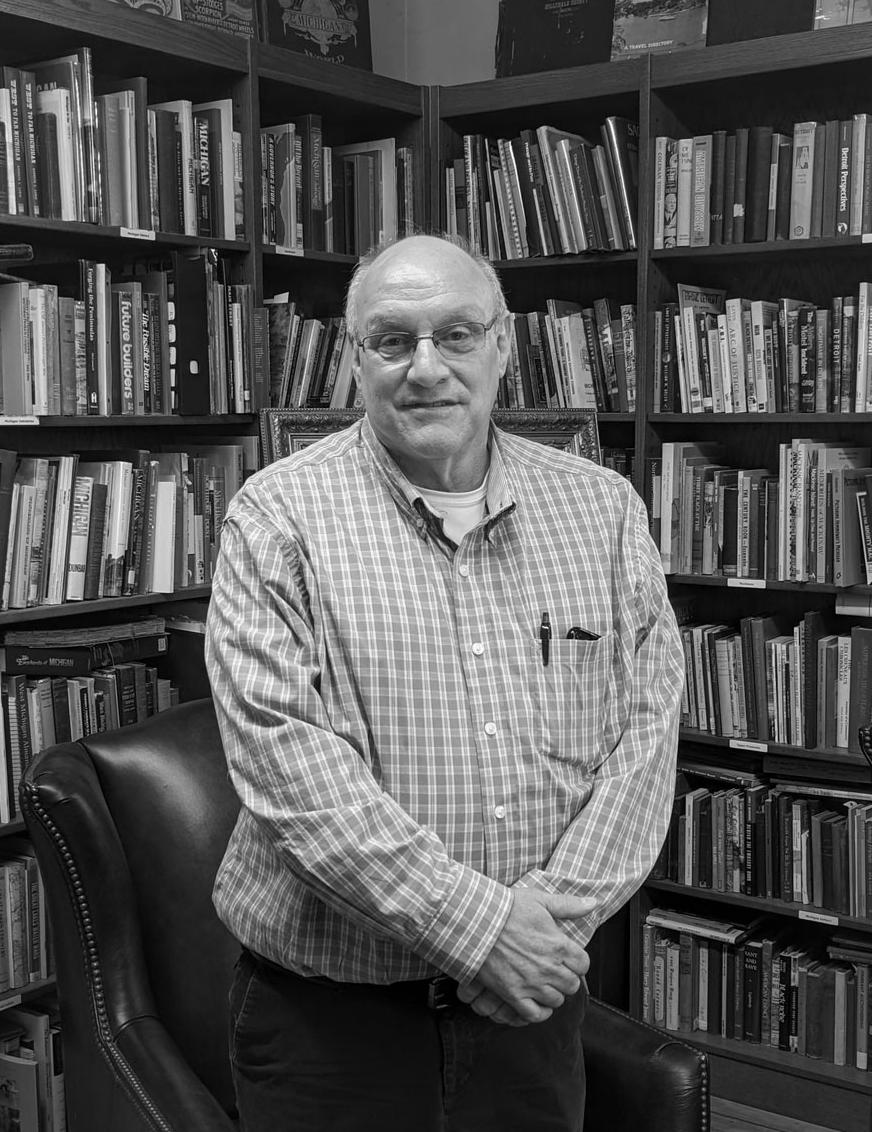
Hodshire has served as sheriff in the county since he was elected in 2020. Hodshire also endorsed President Donald Trumpduring last year’s Republican primary, The Collegian previously reported.
The former mayor has also acquired the endorsements of former Ward 3 city coun -
Sessions will face Ward 2 Councilman Matthew Bentley in the mayoral election. Whoever wins this election will serve a year-long term and could choose to run in the
HOPE from A1
Several city officials, including City Assessor Kim Thomas and Public Services Director Jason Blake, assisted the Department of Public Services crew in taking down the structure. City police officers, firemen, and Board of Public Utilities electric workers were also on site. Workers endured verbal taunts from some onlookers, including DesJardin’s mother, Shelley Hebert, but the process was smoothly completed in a little over three hours.
The application for HOPE Harbor is currently under review by the city staff for completeness and compliance with local ordinances, Assistant City Manager Sam Fry said. Once the staff review is
Kelemen, and Barry Hill, a board member of the Local Development Finance Authority.
Kelemen ran in the August mayoral primary but did not earn enough votes to make the November ballot.
“As you consider your vote — I’d ask that you consider casting your vote for Scott Sessions,” Kelemen said on social media Oct. 21.
Sessions, who served as mayor 2013-2017, told The Collegian last week he’s running for mayor again after the “political nightmare” and “toxic work environment” that he said some councilmembers, including his opponent, have created for city staff.
He also said the council and staff “worked together very well” and “got a lot of
“I am extremely proud of his endorsement.”
cilman Bruce Sharp, former mayoral candidate Cathy
complete, the application will be forwarded to the planning commission, which will review the application Nov. 19 at the earliest.
“The planning commission’s review will determine whether the proposed use of the property is consistent with the city of Hillsdale’s zoning ordinances,” Fry told The Collegian in an email. “If approved, the applicant would need to obtain a zoning compliance permit from the city and a building permit from the county prior to beginning any construction. Following completion of construction, the facility would have to pass all required inspections before a use and occupancy permit is granted, and the facility could open for use.”
Over the past three years,
things accomplished” when he was mayor.
Camp Hope housed more than 300 residents, the majority of whom stayed in the camp for three months or less, according to records DesJardin shared with The Collegian. The records indicate about 50% of residents moved from Camp Hope into permanent housing after they got back on their feet.
Former Camp Hope resident Brent Gale, 42, said he was homeless in Hillsdale for two years before he moved into Camp Hope for two months. He is now seeking employment while moving into an apartment in Hillsdale.
“After two years of being in a tent surviving Michigan winters, this place was amazing,” Gale said at the demolition last week, pointing out

Finish Line from A1
“Do you remember that day?” Bonner asked Slade. “I saw my brother’s name come up on the caller ID, and it actually scared me, because I thought something bad had happened with my kids or my family. But he said, ‘I just want to talk to Lisa — does she have a minute?’”
Carr and Slade closed on the sale July 21.
“I had it for sale probably for a year and a half, and got a few inquiries, but nothing solid, until Gavin came along,” Slade said.
Before buying the Finish Line, Carr served as a vice president of a Tier 1 automotive company in Litchfield, Michigan.
“I worked there for 33 years and just decided it was time for something new,” Carr said.
Besides working as a waiter and night kitchen manager at American diner chain Big Boy after graduating high school, Carr said he had no restaurant experience. In the weeks following the sale, Carr said Slade would help him resolve
issues when he was starting out.
Slade and Carr both agreed on a difficult change for local businesses over the past 30 years.
“One big thing that’s changed is the labor market,” Slade said. “It used to be no problem getting the help that you wanted in any position, but over the years, that has changed. Even before COVID, it was changing. COVID definitely threw it for a tailspin.”
Carr has expanded the hours for the restaurant. Finish Line has added hours on Monday and Thursday nights, now closing at 8 p.m. instead of 3 p.m.
“There's been a lot of the community that's always come up and said, and probably to Lisa, too, ‘When are you going to be open more in the evenings?’” Carr said.
Carr said they’re not taking anything off the current menu yet, but may try to add other items.
“Some new things that maybe can attract some other clientele, like a higher grade bacon as an example, or certain cheeseburgers or new

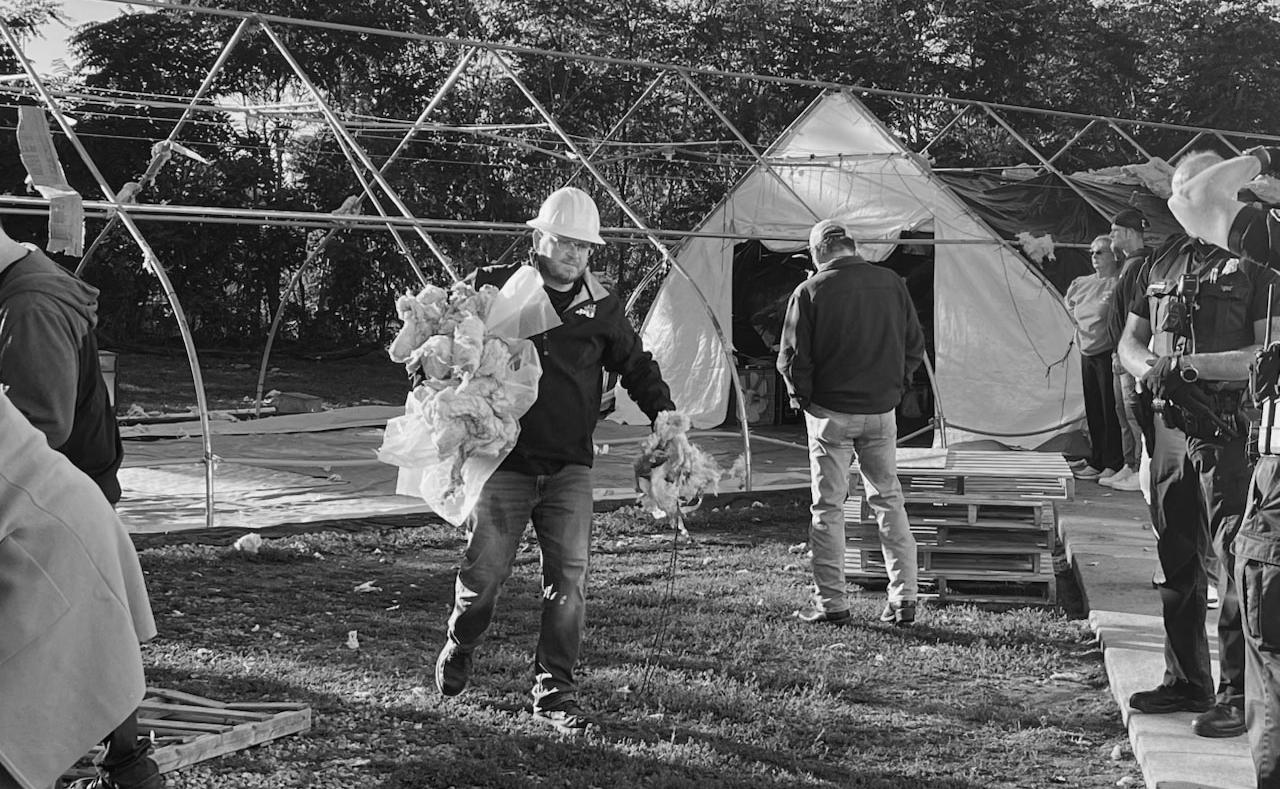
the spot where his bed once stood. “This was a home.”
Gale said if he had not found DesJardin when he did, he would have relapsed into his methamphetamine addiction, landed in prison, or gotten killed.
“They’re destroying a lot of people’s sanctuary and their peace of mind,” Gale said.
“It don’t look like much, but when you don’t have nothing, something like this is everything: a place to eat, a place to bathe, a place to do your laundry. People that will help you on the drop of a dime. You don’t find that anywhere else.”
Howard Spence, a resident in the neighboring Apple Run Apartments, thanked the city council for condemning Camp Hope at the council’s meeting Monday, expressing
sandwiches that we came up with that are priced a little bit more appropriately," Carr said. “That may not appeal necessarily to the senior citizen crowd, but college kids, people that are still working, it might appeal enough.”
Carr said supply costs have already increased since he bought the restaurant.
“I've only had it for three months, and material costs have gone up probably 2-3% in three months,” Carr said. “Other than eggs — they have actually dropped a little bit. But everything else has still gone up.”
Thirty years ago, Slade suddenly took over the restaurant when the previous owner died in a car crash while driving home from work. At the time, she was the manager and had the opportunity to purchase the restaurant. She did.
“It was kind of scary, because you're putting your everything on the line,” Slade said. “But I had worked here for so long that, at that point, I felt comfortable in my knowledge of what to do. So it wasn't that scary either. I just felt like I should do it, and I
could do it.” She said she has dreams about still running the restaurant.
“They're good dreams, but restaurants are a tricky deal,” Slade said. “I'll tell you the secret to a successful restaurant. You have to have good service, and you have to have good food at a reasonable price. That's all you have. But it’s tricky to get all of those three things at the same time.”
concerns for the personal safety of Hillsdale residents near the camp.
“I thank you guys for taking that tent down,” he said.
“It wasn’t safe.”
DesJardin said the city officials did their jobs by tearing down the structure, but she is disappointed in what she sees as a lack of humanity on the part of city council and staff.
“It’s their job to uphold the ordinances,” DesJardin said.
“It’s as plain as day that they pick and choose who they uphold it for.”
DesJardin said the council favors Share the Warmth, a non-profit warming shelter open nighttimes Nov. 1-April
1 at Sozo Church, which does not have an occupancy permit. The council addressed DesJardin’s assertion of a
plies. “I told the staff the other day that I think this will make 10 weeks with one week in 10 that I haven’t had to call a
double standard at its Monday meeting.
“This is an ancillary use of the church consistent with the overall mission and common practices at many churches, even if not advertised,” Thomas said in an email read aloud by city manager David Mackie at the meeting. “This is not a change in the primary use of the building, so no special permits were required.”
Some of the former residents of Camp Hope said they were temporarily staying in the adjacent storage building set to be converted into HOPE Harbor.
“I will do my very best to keep them safe,” DesJardin said when asked what comes next for the residents.
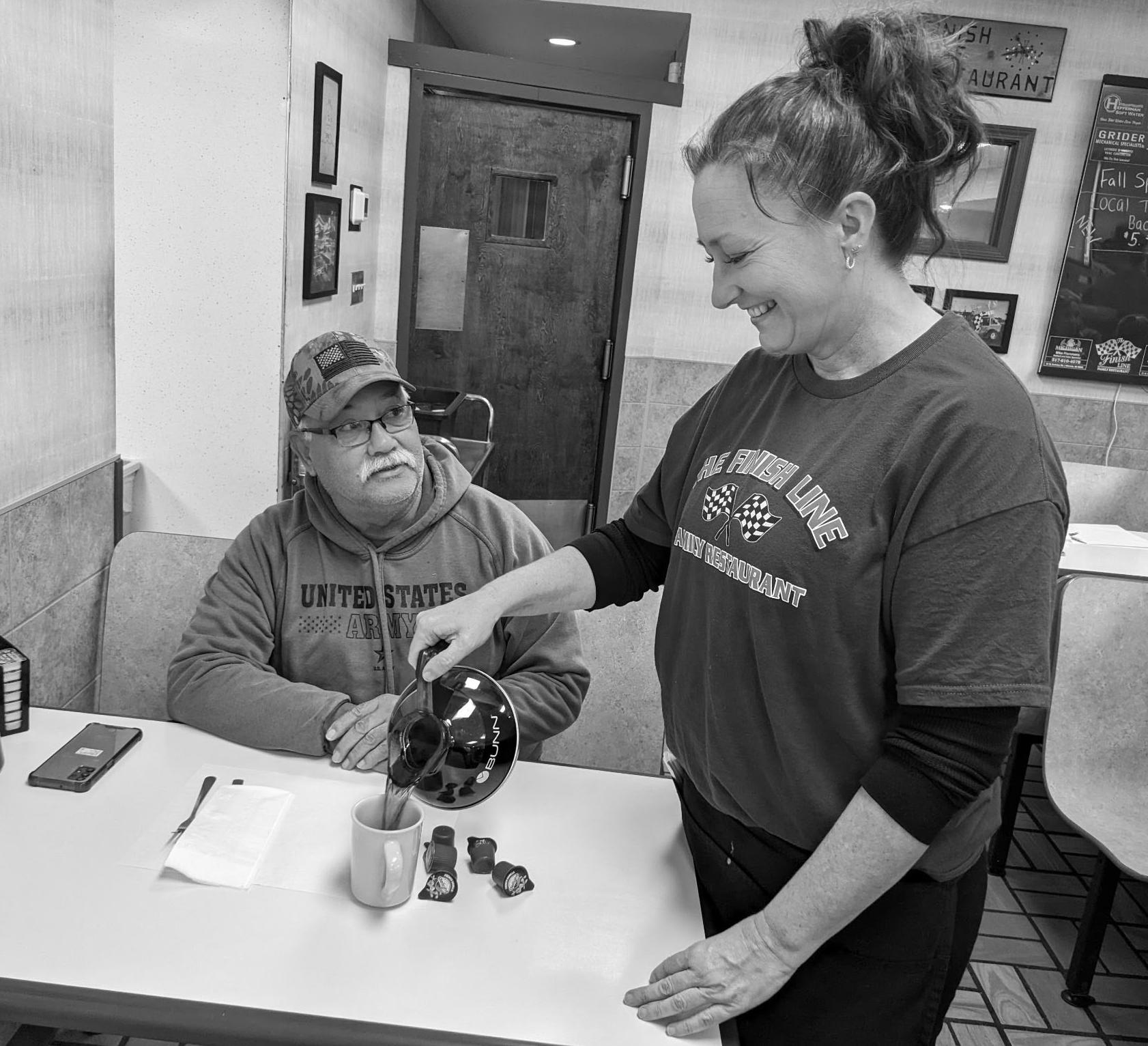
Carr said he expects challenges ahead. Does he have any horror stories?
“Which week?” Carr re -
water softener that had to be replaced. I've had three calls on air conditioning — that's probably just maintenance on the coolers, though. We had to tear the cash register apart the other morning when we were open and busy because the drawer got jammed up inside it and we couldn't get it
“Anyway, this has been a good week so far,” Carr said. “If I can get through this week and the next,
City workers remove the tent structure Oct. 16. Moira Gleason | Colle G ian
Missy DesJardin and her husband, Brian, while Camp Hope is being removed. Moira Gleason | Colle G ian
Carr's sister, Krysta Bonner, serves a patron. Tho M as M C Kenna | Colle G ian
‘Bucket list complete': Senior Chris Tufaro tries KFC for the first time at Hillsdale's new location. Gemma Flores | Collegian
Scott Sessions served as mayor from 2013-2017. Tho M as M C Kenna | Colle G ian
SportS
World Series winner? The Dodgers.
By Christian Papillon Assistant Editor
The Los Angeles Dodgers handed the Milwaukee Brewers a four-game sweep in the National League Championship Series to face the Toronto Blue Jays in the World Series, with Game 1 kicking off Oct. 24. Thanks to their combination of offense and pitching, as well as the presence of twoway superstar Shohei Ohtani, the Dodgers will repeat as champions.
The Dodgers have been a powerhouse in the National League for more than a decade, making the postseason every year since 2013 and winning the division in all but one of those seasons.
Aside from Ohtani’s heroics in Game 4, Dodger pitching was the main story of the NLCS, as the Brewers could only muster one run in each of the four games.
The Dodgers’ pitching staff
was around league average for the regular season with a 3.95 team ERA. But it’s been much stronger so far in the postseason. Through 10 postseason games, the Dodgers’ pitching has combined for a 2.45 ERA along with 104 strikeouts through 92 innings.
Yoshinobu Yamamoto is the ace of the staff. In his second season with the Dodgers, he had a 2.49 ERA with 201 strikeouts in 173.2 innings. Although they all struggled with injuries during the regular season, Tyler Glasnow, Clayton Kershaw, and Emmet Sheehan each had sub-3.5 ERAs, and are healthy for the postseason. Ohtani also returned to the mound for the first time since 2023, and in 47 innings, had a 2.87 ERA with 62 strikeouts.
The Dodgers’ offense was a force this season, with five players hitting at least 20 home runs. Ohtani is the runaway favorite for NL MVP this
year after putting up another monster season with 55 home runs, 102 runs batted in, and a .282 batting average, along with 20 stolen bases. After slumping early in the postseason, Ohtani broke out in Game 4 of the NLCS, hitting three home runs and pitching six shutout innings.
Although Mookie Betts battled an illness at the beginning of the season that caused him to lose 20 pounds, he recovered and hit .279 with nine home runs and 37 RBI after the All-Star break.
But the Blue Jays will be a tough match, as they have the offensive trio of Bo Bichette, Vladimir Guerrero Jr., and George Springer. The Blue Jays, however, don’t have any individual player who can match Ohtani’s offensive output.
On the pitching side, the Blue Jays were slightly worse than the Dodgers in the regular season with a 4.19 team
ERA. Unlike the Dodgers, however, the Blue Jays have not improved in the postseason, with a 4.36 team ERA after the ALCS.
The Blue Jays also barely survived the Seattle Mariners in the ALCS, stretching the series to seven games. The Mariners had four starters hit .200 or less in the postseason and still nearly beat the Blue Jays. The Dodgers’ lineup is more formidable and will pose a greater challenge to Jays pitching.
The Dodgers took two out of three from the Blue Jays at Dodger Stadium earlier this season. The Blue Jays can certainly win a game or two, but in the end, their pitching will not be a match for the mighty Dodgers lineup.
Final prediction: Dodgers in six.
Volleyball
Chargers return with
three losses
By Grace Brennan Assistant Editor
Despite recording one of their best sets of the season against University of Missouri-St. Louis, the Hillsdale volleyball team, ranked 4-3 in the Great Midwest Athletic Conference, let three games slide over the weekend.
Missouri-St. Louis, Wayne State University, and Grand Valley State University played Hillsdale Oct. 17-19, defeating the Chargers in their respective games.
Hillsdale’s game against the current Great Lakes Valley Conference leader, Missouri-St. Louis was a Hillsdale win in the first set, 25-22. According to junior Chloe Pierce, it was one of the best sets they’ve won all season.
Season closes with third-place finish
By Ameera Wilson Collegian Reporter
The Hillsdale men’s golf team ended the fall portion of the season shooting a 903 with a thirdplace finish behind runner-up Findlay University and champion Grand Valley State University in the Nemacolin Intercollegiate at the Nemacolin Resort in Farmington, Pennsylvania, Oct 20-21.
The team is currently ranked third in the Midwest Region and 25th nationally in the NCAA Division II.
“I think we had a good fall as a team,” junior Robert Thompson said. “This will probably be close to the highest the team has been ranked after the fall semester.”
Games Golf
Thompson once again finished in the top 10, tying for sixth with a 73-74-73.
“I was disappointed with this week’s finish, but very pleased with the fall as a whole,” Thompson said. “I finished top 10 in every event and had some low scores mixed in there.”
Head coach Luke Kelly said that the team performed well as a whole.
“They battled tough conditions all week and showed a great attitude in doing so,” Kelly said.
Junior Oliver Marshall had another strong performance and shot 77-74-75=226 for a 13th place finish.
Freshman Parker Stalcup scored 80-73-77=230, placing 26th. He was followed closely
by sophomore Jackson Piacek who placed 27th with an 80-7576=231. Freshman John Cassiday placed 34th scoring 86-7673=235.
Junior Ryan O’Rourke competed as an individual and placed 45th with a 84-79-81.
Now the team is left preparing for their spring season.
“Going to try and get into a better fitness routine and try to get some good practice in while at home over the break,” Thompson said.
Marshall says the team had a good end to the fall and is ready to prepare for spring.
“We had a really solid fall and are in a good spot going into the spring as far as rankings go,” Marshall said. “I’m hoping we can keep up the momentum



that we have and build on our strong performance during the off season.”
Kelly agrees that the team is in a strong place going into the next portion of their season, but has work to do.
“We had a successful fall season and put ourselves in a good position going into our spring season,” Kelly said. “I still think this team can improve in the offseason and become great. We are going to focus on getting better everyday. The sky is the limit for this team.”
The Chargers will play again in Murray, Kentucky at the Dragon Spring Invitational on March 16, 2026.
not appear in that row or column).

Hillsdale had a hard time holding back the Grand Valley Lakers on Saturday in the first two sets because of the Lakers’ 32 total kills in the first set (2519) and the second set (25-16). Close to a sweep, Hillsdale stepped up its game in the third set to extend the match with a 25-22 victory. The Chargers scored the first three points with two kills and a block, and led the game with Grand Valley never going up for more than one point.
“We're excited to get back to practice this week to get ready for Friday.”
“We had some of our best plays yet this season in our first set against Missouri-St. Louis where we served tough, stayed disciplined in blocking and defense, and remained fearless offensively,” Pierce said.
Missouri-St. Louis led the second set and stuck with it through the third set, winning 25-16 and 25-21. Hillsdale took the lead in the fourth set, holding a 21-20 lead before Missouri-St. Louis took the last five of six points in the game, changing the score to a 25-22 Missouri-St. Louis victory.
The fourth set began with Hillsdale trailing six points, but two aces from Southland and three kills from Sysum tied the match. Ultimately set four ended with a 25-23 victory for the Lakers. Freshman Grace Drake played strong offense and defense against the Lakers with 17 assists, six kills, and nine digs. According to Drake, the Chargers were met with good competition this week.
“This weekend we saw some really good competition and we made lots of good plays,” Drake said. “We’re excited to get back to practice this week to get ready for Friday.”
Hillsdale plays Northwood University at home Oct. 24.
“Both teams will know each other well,” Gravel said. “Last time the game went to five sets, and came down to the last two points, so it should be a good battle. I’m hoping that we’ve improved more than them since the last time we played. I think we have, but proof is in the play, so we’ll see on Friday.”
Wayne State hit Hillsdale hard from the start, winning a 25-11 first-set victory. Hillsdale won the second set 25-19 due to six blocks, three from senior Adi Sysum, and three from sophomore Jenna Southland. Wayne State took set three 2518 and closed the match with a 25-22 final set victory.
Action Shooting / Shotgun
Top-10 finishes, more to come
By Daniel Johnson Assistant Editor
Hillsdale’s shooting sports crowded the podium across the country, with the action shooting team competing in the United States Practical Shooting Association Georgia State Championship Oct.18 and the shotgun team competing at the National Sporting Clays Championship in Texas Oct. 19-21.
The action shooting team placed six athletes in the top 10 competing in the Limited and Limited Optic divisions Oct. 18, in Fleming, Georgia.
Freshman William Grohs took first in the Limited division, followed by junior and team captain Kayla Mullin in second, followed by juniors Clara Bozzay and Jianna Coppola and freshman Joseph Beecher in fourth through sixth place.
In the Limited Optic division, junior and team captain John Beecher took 10th place, followed by head coach Adam Burlew, and seniors Joseph Grohs and Jonah Kirstein in 20-22nd place.
“We were much happier with the way we shot than in the last match,” John Beecher said. “I was really happy to end on a good note.”
According to Mullin, there was a high level of competition at the match, which emphasized speed more than previous matches.
“It was definitely a high level match,” Mullin said. “The stages were designed really well, and
they were a little bit different because they were a lot shorter, and the targets were a lot of times closer and easier, which meant that your speed mattered more.”
Mullin, who’s recently battled wrist injuries, said the match gave her the opportunity to regain confidence.
“I haven’t been able to practice for like a month because of my arms,” Mullin said. “I was able to unlock a new level of being able to move quickly and shoot at the same time. That was super exciting.”
John Beecher said that the match was a good way to end the fall season and build momentum for the spring season.
“It’s great to be able to go out with a good feeling,” John Beecher said. “I’m hyped to come back strong.”
The Hillsdale shotgun team competed in the National Sporting Clays Association Championship from Sunday until Tuesday.
The team competed in two divisions of Sporting Clays events, the Beretta Shooting Sports Challenge and the Main Event, against shotgun teams and clubs from across the country.
Places for the competition are not final since the shoot doesn’t end until later this week, but the Chargers did have some standout scores according to senior team captain Leif Andersen.
Senior Davis Hay shot 79/100 in Super Sporting in AA class,
while junior Alex Hoffman shot 73/100 in the B class of the same event. In the Main Event, junior Madeline Corbin shot 228/300 in A class while Hoffman shot 227/300 in B class. In contrast to the consistent targets of Trap or Skeet, Sporting Clays events involve shooting targets coming from a wide variety of trajectories. According to Andersen, the Texas shoot is one of the largest in the Sporting Clays arena.
“The NCSA National Championship is the biggest Sporting Clays shoot in the nation, if not the world,” Andersen said. “For the Chargers, it means a chance to compete on the biggest stage in Sporting Clays.” Corbin said the team attended the event to sharpen their skills for the Association of College Unions International and Scholastic Clay Target Program Upper Midwest Championship in March. Corbin added competing in Texas also prepares them for the spring because the courses are the same. According to Andersen, the Chargers shot well and were grateful for the opportunity.
“The competition went well as a whole,” Andersen said. “We are incredibly fortunate to be able to travel to this shoot.” The action shooting team will compete at another United States Practical Shooting Association match in Linden, Michigan Oct. 25, and the shotgun team will compete at the Michigan College State Shoot at home on the same day.
The numbers around the border indicate the length of the longest runs of consecutive noughts or crosses in that row or column (a zero means that symbol does
Internal conflict: New staff, young roster
By Patrick Hamilton Collegian Freelancer
With one of the youngest rosters in the Big Ten, the University of Michigan is outperforming preseason expectations. But its coaching staff’s conservative approach is holding its young players back.
After their win over the University of Washington Huskies, the Michigan Wolverines have solidified themselves as the fourth best team in the Big Ten and climbed their way back into the AP Top 25. With the Maize and Blue now 5-2 overall and 3-1 in conference play, this season has proven to be a formidable test for both the roster and coaching staff alike.
Led by 18-year-old freshman quarterback Bryce Underwood, this year’s Wolverines have the youngest starting lineup in the Big Ten. Underwood couldn’t even vote until August, but now he has to carry the winningest program in college football history.
Between coaching suspensions and injuries, a roster of underclassmen must assume the helm and navigate a veritable gauntlet in conference play.
Michigan’s passing game has found its center in freshman Andrew Marsh, who has become Underwood’s prime target for deep passes. Marsh entered the spotlight in a win over the University of Wisconsin Badgers, and made himself irreplaceable in a loss to the University of Southern California, gaining 138 yards on eight receptions. Despite hampering injuries in the defensive secondary, sophomores Cole Sullivan and Jacob Oden emerged as leaders in the Wolverines’ most recent win over the Washington Huskies.
With the loss of arguably the nation’s top running back, junior Justice Haynes, the team has leaned on sophomore Jordan Marshall to keep the run game alive. Additionally, Michigan has looked to its pass game to get the job done, getting third string tight end Zack Marshall involved.
This is the story of the Wolverines’ season to this point. The young and shorthanded Michigan roster is learning and developing with remarkable speed. And between the lines of many successes, it’s clear the players are finding their rhythm faster than the coaching staff.
Head coach Sherrone Moore is in his second season with the Wolverines, inheriting very few of prior head coach Jim Harbaugh’s undefeated 2023 national champions. Alongside the transition at head coach, the Wolverines installed Wink Martindale as defensive coordinator in 2024 and Chip Lindsey as offensive coordinator in 2025. But even with so much young talent on the field, Moore and staff are still figuring out just what this team is capable of. They are very clearly playing not to lose, rather than to win. This conservative coaching has made Michigan’s play calling predictable. So much so that opponents are evidently not even concerned with the time-honored tradition of deciphering Michigan’s signs. Lindsey's offense features far too many condensed formations, making Underwood’s task of reading the defense much more difficult.
Defensively, coach Martindale chooses to blitz and not blitz at just the wrong times. The playcallers on both sides of the ball lack creativity — and Michigan is left vulnerable to opposing coaches, like Lincoln Riley at USC and Brent Venables at the University of Oklahoma, who excel at identifying and countering basic alignments.
The 2023 National Championship season is a testament to what Moore and the Wolverines have the ability to do. Once Moore and the coaching staff take off the training wheels, this team performs with soar. It could transform this season from “reload” to “redefine.” This young team could do far worse than two losses. With how well these underclassmen are performing, the next coming years will be special.
The Wolverines look to continue their development this Saturday against the instate rival, the Michigan State University Spartans. Though the Wolverines are currently on the outside looking into the College Football Playoff, a late season hot streak changes their fortunes, especially if it culminates in a fifth straight win against the The Ohio State University Buckeyes.
FROM A10: Hillsdale men pump iron
By Caroline Kurt Opinions Editor
He chalks his hands, makes the sign of the cross, and steps up to the barbell. The goal? Make lifting 500 pounds look easy.
The Hillsdale College Powerlifting Club held its annual on-campus meet Oct. 18, bringing together students and faculty for a low-pressure, highstrength competition.
For the second year in a row, sophomore and club treasurer Bruno Gigliotti took first in deadlift and squat, lifting 500 and 425 pounds respectively. Sophomore Michael Golczynski beat Gigliotti by 5 pounds on the bench press, benching 255 pounds and coming in second overall. Junior Matthew Tolbert took third.
“You get a huge adrenaline rush when you know you’re about to compete,” Gigliotti said. “Then your brain clears when you’re in there and there’s only one thing on your mind.”
The club uses Dynamic Objective Team Scoring to mathematically represent a lifter’s relative strength given their sex and bodyweight. Final rankings are determined by adding together a lifter’s total DOTS score from all three lifts. With a 1,175 pound total across all three lifts, Gigliotti came in first with a DOTS score of 384.38.
“I've been dealing with a glute injury for almost the last year, so it's been kind of up and down, which is why only my bench was better than last year,” Gigliotti
Coach from A9
Brennan, who goes by “Coach Brie,” led the Chargers to a 21-9 season last year, exceeding 20 wins for the fifth time in program history. The record included 16 Great Midwest Athletic Conference victories, the most by the women’s basketball team since the 2008-09 season. The team even received its first NCAA tournament bid since the 2017 season.
Basketball has always been a huge part of her life, Brennan said, even though she didn’t originally think it would become her career.
“I started playing basketball when I was really young,” she said. “It was something that my dad and both of my sisters loved. So as all three of us grew up, it was just an important part of our lives.”
After graduating Woodhaven high school, located in a suburb of Detroit, Brennan committed to play basketball at Gannon University in Erie, Pennsylvania, which she said had a great athletic community and coaches, something that she was looking for in a college. But right before her freshman
said. “I'm getting close to the light at the end of the tunnel.”
Junior Joshua Marting, the club president, ran the meet.
“The goal of powerlifting is to increase your strength,” Marting said. “It’s so much more healthy and holistic than bodybuilding.”
According to Marting, the club draws both seasoned pow-
goals this year is to send a small group to an official off-campus powerlifting meet, as the club has done in the past.
“There are enough guys who have expressed interest,” Marting said. “So we are looking into that.”
According to Marting, the club isn’t just for students: this

erlifters and students who are totally new to the gym.
“It is really hard, with the lifestyle here, to make time to lift regularly,” Marting said. “A part we’ve added to the mission statement is to make training and developing strength as easy and straightforward as possible.”
In addition to their on-campus meet, Marting said club members regularly connect to lift together. One of the club’s
year, the coach she was supposed to play for left the school for a new job.
“I still went there for basketball, and then unfortunately, the coach that they brought in just really started dropping the standards very quickly and wasn’t treating us well,” Brennan said. “After junior year, it wasn’t something that I wanted to be part of anymore, which is devastating, because at that point in time, basketball was way too much of my identity.”
While still at Gannon, she stepped away from basketball and walked onto the volleyball team for her final two years of college, a change that she said helped her realize that there was more to her life than sports since she made such a pivotal change. Post-graduation, Brennan taught first grade for a year before deciding to get her master’s in sports administration and become a graduate assistant at Eastern Illinois University.
“I feel like the Lord was super present during that time getting my master's, and just helped guide me and set my heart on fire for creating an experience that was better than
year, Charles Yost, assistant professor of medieval history, lifted the second heaviest in deadlift, with a weight of 405 pounds.
“The club is co-ed, and all students, faculty, and even alumni are welcome,” Marting said.
Ian Church, assistant professor of philosophy, serves as the club’s adviser and judged this year’s competition. When
what I had,” Brennan said.
Through a mutual friend, Brennan found out Hillsdale was hiring an assistant coach. She applied, hoping to get the job since it would bring her closer to home and allow her to coach Division II.
“I think going from Division I as a graduate assistant to Division II, you just have a lot more life and family balance while also competing at a high level, so us being DII here was a big draw for me as well, because it has balance for student athletes, but also balance for us coaches, too,” Brennan said. “I interviewed here, loved it, and was so excited for the opportunity.”
Associate head women’s basketball coach Abbey McNeil attributes the team’s strong community to Brennan’s dedication to the program’s values.
“She implemented our team’s core values of gratitude, love, and respect, which has taught the girls that it means the most when we live these out every day with everyone we encounter,” McNeil said.
McNeil said Brennan is a devoted and loving coach who gives her time and effort to everyone on the team.
he came to Hillsdale in 2016, Church said, there wasn’t as much of a weightlifting culture present. Since then, the college has introduced Man Up events and built gyms inside all of the campus dorms.
“The college has been able to speak to that more basic, human view of health and thriving with pushing strength training and sports more generally,” Church said. “We are not just brains on a stick, but embodied creatures, and our mental health and cognitive health is closely tied to our physical health.”
Though he had been lifting weights since high school, Church said he began taking it more seriously around the time of the COVID-19 pandemic.
“I’d struggled with anxiety for a long, long time,” Church said. “During COVID, I started getting into the gym a lot just because it was so helpful just to get out of the house and push some plates.”
Gigliotti said he also appreciates the mental health boost powerlifting gives him.
“If I have a lot of homework, boring classes, or a hard week, then I just get in the Splex or Founders and go crazy,” Gigliotti said. “I always have a blast, and it makes my day way better.” Gigliotti and Marting spoke about the desire to bring more newcomers into their sport.
“Plato said you need to have a strong body as well as a strong mind,” Gigliotti said. “We need to get more people lifting rather than cooped up reading Aristotle.”
“Brie makes every single person she meets feel like the most important person in the world,” McNeil said. “She is such a positive light and loves these girls harder than any other coach could. Her words match her actions with the care she has provided for the girls.” Junior Annalise Pietrzyk said she loves the team atmosphere that Brennan has cultivated during her few years as head coach.
“I appreciate Coach Brie’s ability to connect with us off the court, but she also holds us accountable on the court,” Pietrzyk said. “We truly believe she has our backs.”
As she steps into her third season as coach, Brennan said she hopes that this award can be a reminder of all the hard work her entire coaching staff has done and will continue to do in the years ahead.
“‘Coach of the Year’ sounds great, but ‘Staff of the Year’ sounds better,” Brennan said. “I just want everyone to know that what we're doing is going to be consistent, and we’re also going to keep doing it the correct way to maintain that success and all the wins.”
What is your favorite family tradition?
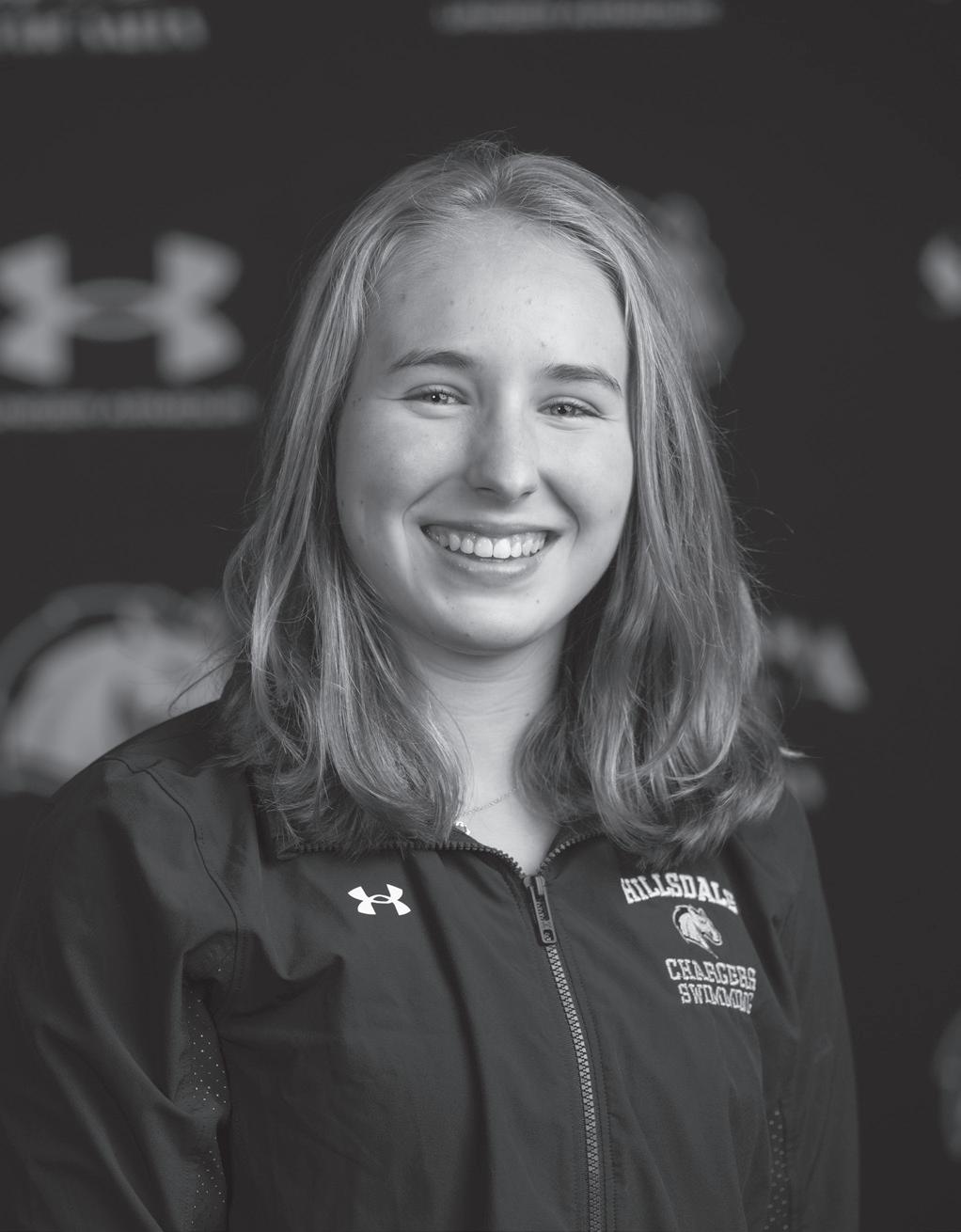
Describe yourself in 3 words: Quiet, focused, cheerful.
Compiled by Francesca Cella
Photo Courtesy | Hillsdale College Athletic Department
Yost deadlifts 405 lbs. for a personal best. Caroline Kurt | Collegian
C harger S port
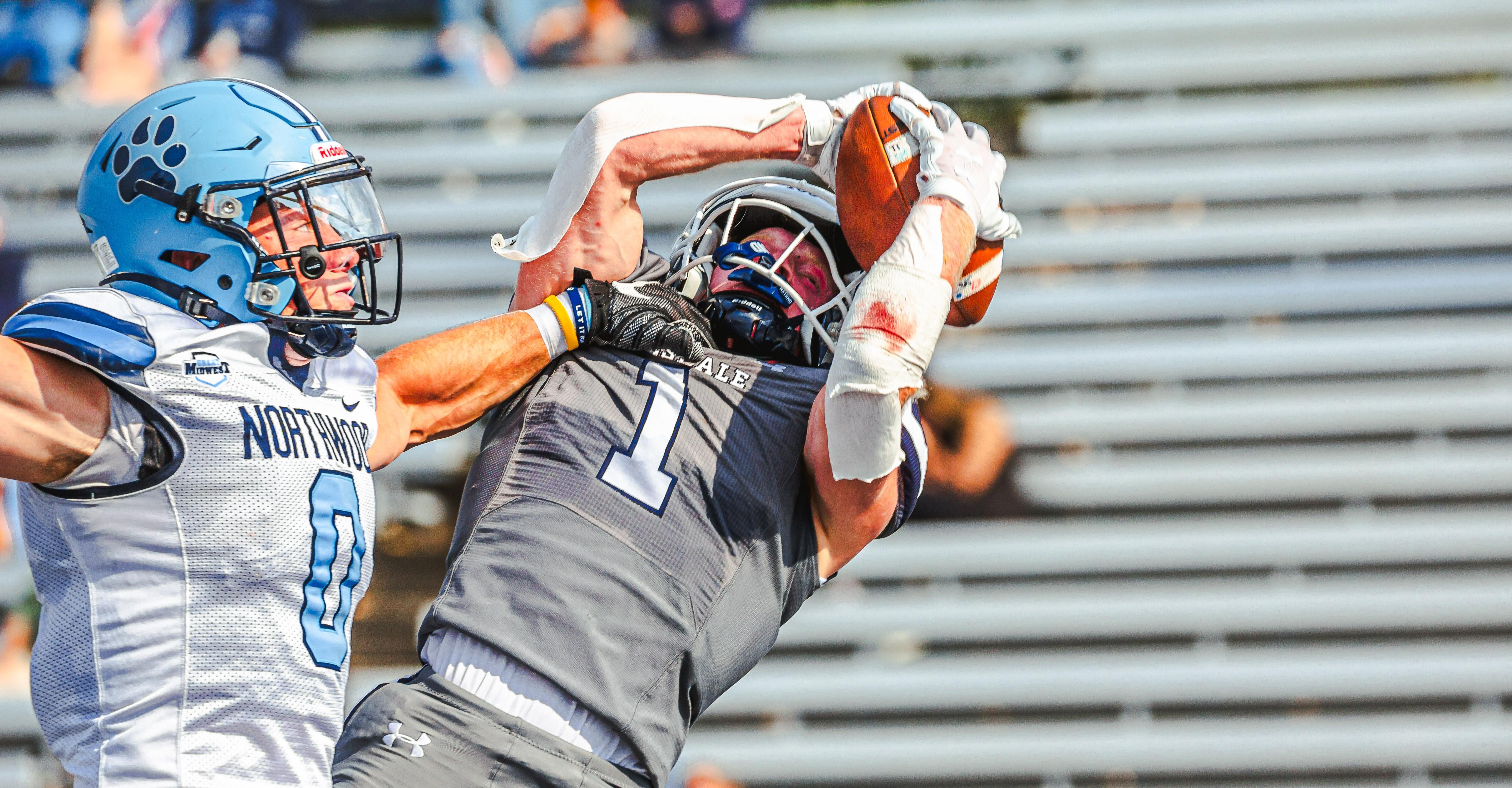
Chargers fall to Northwood
By Christian Papillon Assistant Editor
The Hillsdale football team lost 48-19 at home against Northwood University Oct. 18, moving its season record to 2-5, and its conference record to 1-4.
“We played with great effort, but unfortunately, it wasn’t enough to overcome our mistakes,” head coach Nate Shreffler said. “The offensive line did a solid job protecting the quarterback for the second week in a row, and the wide receivers made a number of contested catches. Both of these are positives and will need to continue.”
Sophomore quarterback Colin McKernan led the Chargers in both passing and rushing, with 253 yards through the air and 51 yards on the ground.
“It’s always good to have a threat on the ground,” McKernan said. “It’s another thing for defenders to watch out for. Obviously, we’d like to get our running backs to be the leading rushers, but when the quarterback’s on the ground, it’s also a big thing.”
With the win, Northwood claimed the inaugural Riepma Cup traveling trophy. The award is named for former Hillsdale quarterback Pat Riepma ‘83, who went on to be Northwood’s winningest football coach in
Coach of the Year
By Elaine Kutas Sports Editor
As an assistant coach, Brianna Brennan wrote the words of Proverbs 11:14 on a sticky note and placed it on her bedside table that read, “for lack of guidance, a nation falls, but victory is won through many advisors.”
She found it again a year later, and saw it as a nudge from God to accept the women’s basketball head coaching position in only her second season at Hillsdale College.
Now, as Brennan prepares for her fifth season with the Chargers and her third season as head coach, the Basketball Coaches Association of Michigan on Oct. 4 named her 2024-25 Coach of the Year.
“Receiving this award is awesome,” Brennan said. “I'm super grateful for it, but even when you receive an award like that, and it's kind of like, well, I'm not satisfied. We want to keep doing what we're doing here well, and we want to maintain it too.”
Coach A9
program history and Northwood’s athletic director before his death in 2015.
Northwood scored a touchdown on its opening drive and added two more before the end of the first quarter to take a 21-0 lead.
The Chargers scored touchdowns on their first two drives of the second quarter, but missed the second extra point attempt, cutting the deficit to 21-13.
Northwood answered back with another touchdown and then kicked a 46-yard field goal with 10 seconds left in the half to move out to a 31-13 lead.
The Chargers scored a touchdown in the third quarter, but were otherwise held scoreless in the second half.
Northwood added two touchdowns and a field goal to move the game to its final score.
In spite of the loss, McKernan said the team's energy is generally positive.
“We’re not a team that’s going
to turn on each other or divide in the locker room,” McKernan said. “Through all the goods and the bads, we’re going to stay together.”
Sophomore receiver Tutt Carrico had a career-high 143 receiving yards, including a 42yard touchdown reception in the third quarter.
“We made several plays on both sides of the ball. It just was not enough,” Carrico said. “We need to clean up pre-snap penalties.”
McKernan said the team is going to work on building discipline going into the next game.
“The discipline that we have right now is not up to the standard of what we need it to be,” McKernan said. “That’s going to be a heavy focus all week. We just need to stay focused on what we need to do and what the standard is.”
The Chargers will next face Lake Erie College at home in their Military Appreciation Day game Oct. 25.

Hillsdale men pump iron in competition
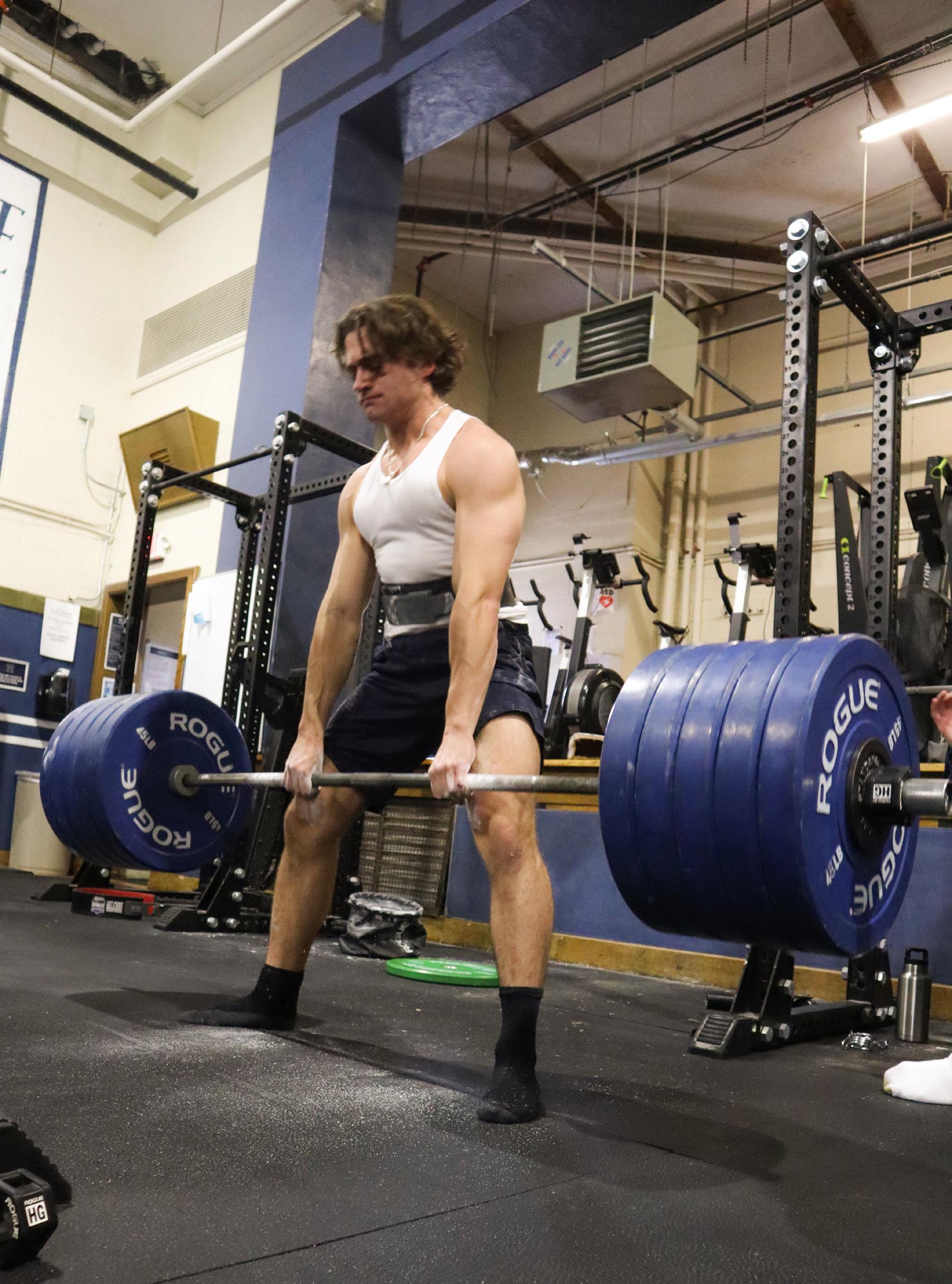
First homegrown Charger: Larry Covey
By Ty Ruddy Culture Editor
Growing up in Hillsdale, Larry Covey ’65 ran the three blocks to Mauck School every day. On Saturday he became the first to receive the Hillsdale athletic department’s newest honor, the Homegrown Charger Award.
The new award came from a desire in the athletic department to recognize citizens of Hillsdale county who stayed in town through college, according to Athletic Director John Tharp.
“We want to celebrate the people who loved Hillsdale enough to stick around and we wanted to connect the college to the county,” Tharp said.
He also said there was no better person than Covey to receive the inaugural award.
Covey grew up poor and knew from an early age that athletics would be his chance at a college scholarship. He played every sport he was allowed to play. He played baseball from a young age, but decided to run track in the spring of his freshman year of high school.
“To make that transition and continue to be a star at the next level is a special thing to achieve as an athlete, and to do that in your own backyard, with many of the same people who rooted for you in high school in the stands, has to be especially meaningful.”
On the gridiron, Covey earned Outstanding Defensive Back for the Dales and eventually became only fouryear letterwinner in the class of 1965.
Covey also played basketball for two years at Hillsdale and wrestled for a year. He was twice a recipient of the Kimball Medal, an award given to the top male athlete each year.
When Covey graduated, according to Gensterblum, he signed a contract to play with the Philadelphia Eagles but a knee injury ended his stint early. Upon graduation, Covey taught for one year at Jackson high school and then worked construction.
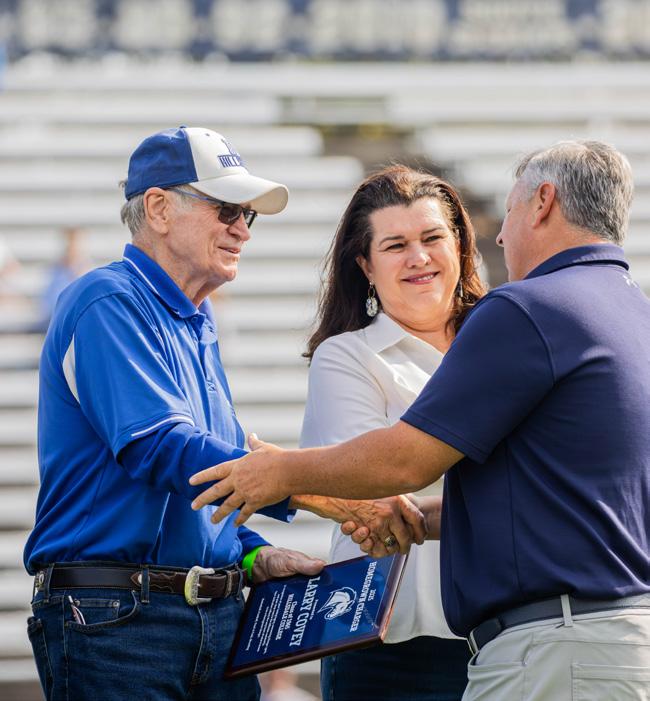
“My dad was a baseball player, so I was, too,” Covey said. “But when I realized I wouldn’t start my freshman year I decided to run track. I did the long jump, high jump, I threw the shot, ran the 100, 200, 400; I did it all.”
In his first meet, Covey earned enough points to letter. The next year, the administration at the school allowed him to play baseball and run track. Covey also started on his high school football team as a sophomore.
In 1961 he enrolled to run track and play football for the Hillsdale College Dales.
“People probably don’t believe me now, but I might have scored more points for our track team than any other person,” Covey joked. “It’s because I ran eight to 10 events every meet. “
During his time at Hillsdale, Covey set six school records for the Dales. In 1965 when Covey was a senior and a captain for the track team, the Dales were undefeated in dual meets.
“Larry was someone who came in highly touted and lived up to his reputation on the playing field,” said James Gensterblum, director of athletic communications.
“I had no experience in construction really but I had a wife and three young kids and we needed a house,” Covey said. “I bought two books, talked to people, and just sort of figured it out.”
After the infamous blizzard of 1978, Covey said he and his wife had enough of the weather. They sold their house and moved to Arizona. They continued to raise their family and Covey started his own contracting business. Covey said that despite the distance, his love for Hillsdale College never faded.
“The principles behind the school and the foundation are something to marvel at,” Covey said. “It’s one of the institutions that still teaches American history the right way. As a former history teacher I am thankful for that.”
Tharp said that the Homegrown Charger award is, in turn, a way to thank Covey.
“It’s fun to see the history of Hillsdale through a local’s eyes and it’s great to honor the athletic accomplishments because they deserve recognition. But the whole thing is really about thanks,” Tharp said. “There are lots of amazing people from Hillsdale who know how to give back so we want to match that. We are excited to continue honoring homegrown Chargers.”
Freshman Ben Ngishu runs the ball. Courtesy | Sarah Chappelle
See
See Swole A9 Sophomore Bruno Gigliotti deadlifts 500 pounds. Caroline Kurt | Collegian
Covey receives the award. Courtesy | Reva Ludwig

Culture
Simpson ‘men’
By Christian Papillon AssistA nt Editor
From banner drop to football weekends, Simpson residents are the most colorful in the crowd — literally. Simpson’s colorful costumes and crazy antics during games has led Hillsdale PA announcer Warren Miller to dub them, “the most interesting student section in Division II.”
The tradition of Simpsonites dressing up in costumes for campus sporting events and competitions goes back at least a decade, according to seniors and Simpson head resident assistants Nathan Rastovac and Jonathan Williams.
“The oldest picture of guys in costume I saw was from 2015,” Rastovac said. “You can still see some of the costumes out there being worn. It’s crazy how the tradition’s lasted so long.”
Rastovac said the Simpson RAs send emails to the incoming freshmen, encouraging them to bring a costume to campus.
“A lot of guys have their own costumes,” Rastovac said. “They’re a handful that have been passed down for years and years, but most of the costumes are just from guys going to the thrift stores, or Spirit Halloween,
or just asking their grandparents for old costumes they might have.”
Williams said he had fun selecting costumes during his freshman year, which included a watermelon onesie.
“I remember pretty early on going to Walmart with my buddies and trying to find the craziest onesies that we could,” Williams said. “It’s been fun to keep some of those and keep wearing the costumes as a senior that I was wearing as a freshman.”
Williams’ watermelon onesie has since become a staple in the student section at Charger sporting events.
“It’s always funny because a bunch of times, people listening to the radio would hear the announcer look at the student section and reference the fact that there is a watermelon in the stands,” Williams said.
When residents leave Simpson, Williams said, they pass their costumes down to younger students.
“When the guys leave the dorm or they graduate, a lot of the things they wear they give down to somebody who was sort of like a little brother or a younger figure,” Williams said. “It’s really neat that within the silliness, there’s something that’s really meaningful.”
Senior Marc Ayers, who lived in Simpson for three years and
are not taking this seriously
often wore a horse head hat to games, said he enjoyed the tradition of attending games with the student section.
“Simpson’s been wearing funny clothes to games for a long time,” Ayers said. “We kind of take it upon ourselves to dress up funny, to bring energy to those games, and really try to enliven the student section as much as we can.”
Ayers said the costumes bring special life to the student section.
“There’s a certain absurdity that adds to the energy that I think is a whole lot of fun,” Ayers said. “There’s really nothing quite like it. It’s so ridiculous, but it’s so energizing at the same time.”
Rastovac said the student section has a good time heckling the opposing teams.
“We say silly things,” Rastovac said. “We’re yelling randomly, just to get in their heads. Just so they’re like, ‘what are these guys yelling about? It’s not volleyball related.’ No, it’s not volleyball related. It’s totally random, but you’re thinking about us now and not the game.”
Williams said football gives the student section prime placement for heckling.
“We’re placed right behind the opposing sideline, so everything we say has to be heard by the opposing team and the op-
Professors’ Picks
David Murphy, Professor of Mathematics

I turned to these while I was in graduate school for some light reading to complement the journals and textbooks I was reading most of the time. They are fun stories, and I enjoy them as such, but I also appreciate the way Carroll plays with both language and logic in them making sense out of nonsense and vice versa.

Christmas Music
It is difficult to name a single song, but my family will testify that I have a definite soft-spot for Christmas music. From Thanksgiving to Valentine’s Day, I am frequently listening to our collection at home, in the car, and in the office. It is relaxing, joyful, and uplifting. Plus, where else can you seamlessly transition from Bach to Neil Diamond or from crooners to choirs?

“The Hobbit” (1977)
I’ve always enjoyed animated films, but this one stands out in my memories from childhood. I remember watching and rewatching it with my brothers. We can still sing many of its songs, as well as those from the 1980 follow-up, “The Return of the King.”

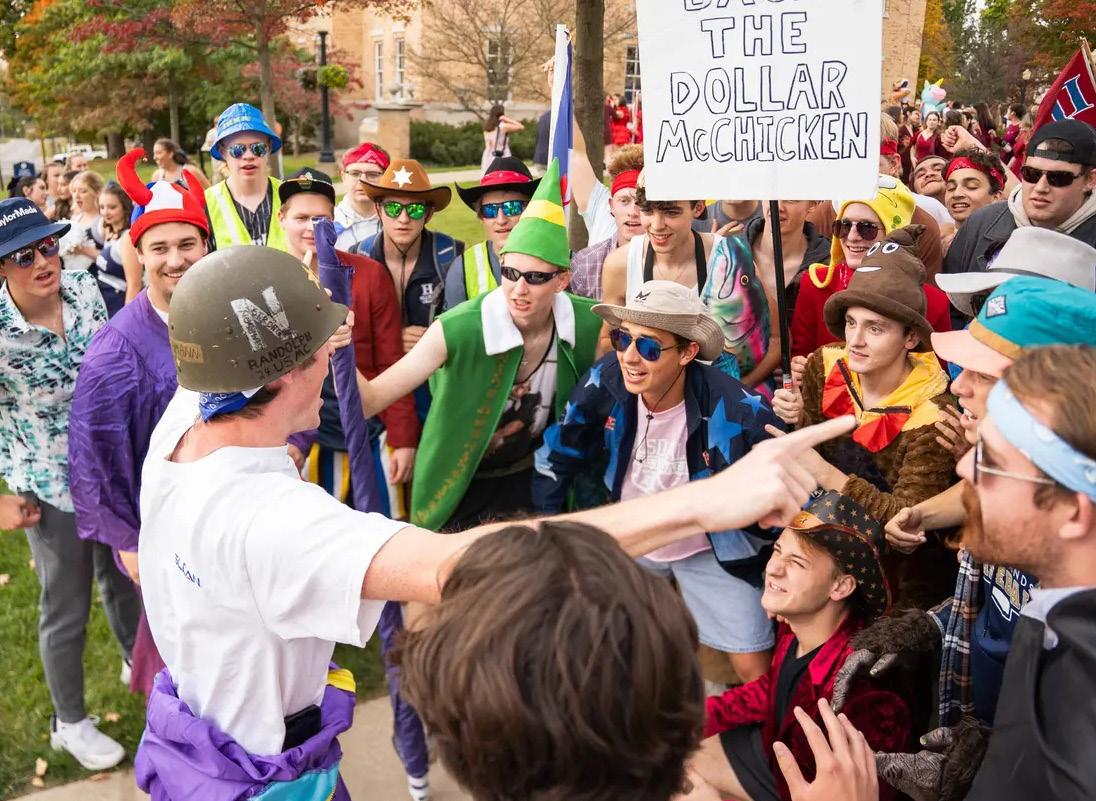
posing coaches, which is really fun,” Williams said. “You can tell that they really get peeved hearing it nonstop. Sometimes the players and coaches will even respond and talk to us, and that’s good when you realize that their focus isn’t on the game. It’s like we’ve become this 12th mantype figure that disrupts the strategy of the opposing team.”
Williams said he distracts the opposing team during free throw attempts in basketball by leading the student section in
singing the “Veggie Tales” theme song or loudly reciting the Hillsdale honor code.
“That’s really fun and when they miss, we kind of credit the miss to us,” Williams said.
Williams said he hopes to see other dorms participate with Simpson in the student section this year.
“We would really love for as many people to come be a part of it,” Williams said. “Even though it’s our tradition, the most rewarding thing for us to
see is when other people wear silly costumes and heckle, too. The more the better, honestly.” Rastovac said cheering with the student section is a way to take a break from the academic rigor of the college.
“We have fun, and we’re focused on having a good time, not taking ourselves too seriously because we’re dressed up as a pizza or a shark,” Rastovac said. “And that’s okay, and that is part of the college experience that we want here at Hillsdale.”

Lewis Caroll’s “Alice” Books
Simpson chants before a football game in 2024.
Courtesy | Student Activities Board
Dr. Murphy attends a Charger football game with his daughter Bronwyn Courtesy | David Murphy
Compiled by Matthew Tolbert Web & Puzzle Editor
Seniors ‘Runaround’ competition in their last Battle of the Bands
By Elaine Kutas SportS Editor
Runaround, an all-senior campus band, secured its first win of the annual campus-wide Battle of the Bands competition hosted by the men’s music fraternity Theta Epsilon at Elks Lodge Oct. 17.
“The concept for Battle is to get a bunch of bands together to play live music, compete, and have fun,” said Daniel Doyle, the lead singer for Runaround. “I’ve heard from a lot of alumni that it’s a lot more impressive now than it was when it began around 10 years ago.”
The competition pits five campus bands against each other, and judges evaluate their stage presence, performance, song selection, and technical ability. The judges panel this year consisted of Nathan Schlueter, professor of philosophy; Paul Schmitt, associate professor of chemistry;
Hollywood
and Christopher Hamilton, professor of chemistry. Runaround secured the win by one point, beating Jett Cruz and the Bahama Mamas, which finished second, and Backspace, which finished third.
Doyle, who is a member of Theta Epsilon fraternity, said that his involvement in the fraternity has helped him enter more fully into the band presence on campus.
“I’ve sang for a while, and I play guitar a lot, but I got interested in Theta because I heard that live music and bands were a thing, and I thought that was cool,” Doyle said. “When you play with really good musicians, you can put together really good songs that are artistic and are truly like art.”
Senior Aidan Christian, lead singer for Jett Cruz and the Bahama Mamas, said that singing and performing are the best forms of creative expression he has found.
has ruined Watson, not Hermione
By Anna Broussard dES ign Editor
Hollywood gives a voice to the least qualified. Like many people, actors and actresses in the film industry have opinions about everything, but for those in Hollywood, their beliefs can be detached from reality.
Emma Watson, 35, is famous for her role as Hermione Granger in the film franchise “Harry Potter,” based on the books by author JK Rowling. Watson filmed eight movies from 2001-2011, developing a relationship with Rowling, who was involved with the films, during the process. As with many Hollywood-based relationships, the two women’s political differences have played out in the public sphere of social media.
In 2020, Rowling posted on the social media platform X, at the time Twitter, about the nonsense of transgender ideology and its denial of reality. “If sex isn’t real, there’s no same-sex attraction. If sex isn’t real, the lived reality of women globally is erased. I know and love trans people, but erasing the concept of sex removes the ability of many to meaningfully discuss their lives. It isn’t hate to speak the truth,” Rowling said in the post.
Rowling’s comments disappointed many fans, inspiring attempts to cancel her for the supposedly hateful comments. Members of the cast, including Daniel Radcliffe — Harry Potter, himself — publicly rejected Rowling’s remarks and denounced her opinion. Watson responded to Rowling in a 2020 post, saying, “Trans people are who they say they are and deserve to live their lives without being constantly questioned or told they aren’t who they say they are.”
In the years since those posts, Rowling has continued to defend her position on transgenderism, even as many actors from the films and former fans have distanced themselves from her.
In September 2025, Watson appeared on the podcast “On Purpose With Jay Shetty.” When asked about Rowling’s 2020 comments and the resulting public dispute, Watson said she will always have love for Rowling.
“I really don’t believe that

“When you’re up on stage it’s easy to forget about the audience because it’s loud and all you can hear is your band mates and yourself,” Christian said. “It’s freeing. It feels like catharsis.”
Junior Henry Webster, a new Theta Epsilon pledge and member of Bottom Dollar, said the pledges were excited to play their first event as a full group.
“We had a really good crowd, bigger than we had expected,” Webster said. “In the past, Theta hasn’t done a pledge band at Battle, so this was a new experience for everyone.”
Christian sees the excitement of starting a band among freshmen as the legacy that the current seniors will leave behind.
“It feels like almost every freshman class comes in, and a bunch of freshmen say I need to form a band, which is exactly what happened to us,”
Christian said. “It keeps happening, and it keeps happening, and I just hope it doesn’t die, because that would be a tragedy, not just for the musicians themselves, but for all of campus.”
Doyle said he hopes that events like Battle of the Bands will continue to draw campus interest in the future, especially after his graduation.
“Every senior talks about how graduating feels scary because there’s a bunch of people in the senior class who are super involved in the band culture, so there’s a little fear as to who’s gonna pick up the mantle,” Doyle said. “But then we get to see a band like Backspace, that placed third and played phenomenally. It’s mostly juniors and sophomores, so they’ll be around next year, and that’s really hopeful for the future.”
Bellet brings bluegrass to Hillsdale
By Elijah Guevara ASSiStAnt Editor
by having had that experience and holding the love and support and views that I have, mean that I can’t and don’t treasure Jo and the person that I had personal experiences with,” Watson said. “I will never believe that one negates the other, and that my experience of that person I don’t get to keep and cherish.”
At the same time, Watson continued defending her support for transgenderism and her fellow castmates. Following the podcast release, Rowling posted on X saying, Watson’s ignorance for the entire situation should be disconnected from her role as Hermione Granger.
“I’m not owed eternal agreement from any actor who once played a character I created. The idea is as ludicrous as me checking with the boss I had when I was twenty-one for what opinions I should hold these days,” Rowling said in a post.
“The greatest irony here is that, had Emma not decided in her most recent interview to declare that she loves and treasures me — a change of tack I suspect she’s adopted because she’s noticed full-throated condemnation of me is no longer quite as fashionable as it was — I might never have been this honest.”
Rowling’s response is a reality check both for fans and for all of Hollywood: the cancel culture that once attacked people for rejecting gender ideology as a religious obligation is no longer silencing dissenting voices.
Watson has every right to disagree with Rowling’s beliefs. But recognizing the opportunity that Rowling’s success has granted her should outweigh her ritual commitment to commenting on the rejection the biological reality of the sexes.
Rowling created Hermione, and Watson brought the character to life. As a result of Watson’s comments the inspiring character of Hermione becomes associated with disillusioned beliefs of gender ideology. It is the duty of her author to correct it, regardless of an actress’s representation of the character.
Hollywood will continue to be a cesspool of leftist ideology, making Rowling’s defense of both biological
and
characters refreshing in the echoes of brainwashed leftist culture.
At the end of each summer, sophomore David Bellet and his family throw a music night for their friends in Nashville to enjoy an evening of country, folk, and Americana before packing his bags to come back to school.
“We park an old Ford outside of our tool shed, and our shed porch becomes a stage,” Bellet said. “We have a lot of families around us that love to play music, so they come over there once you start seeing back-to-school stuff in the stores. Everyone loves to have a little reset before the school year starts.”
For Bellet, the life of bluegrass and country isn’t only a Nashville phenomenon. It also has a place in Hillsdale for those who are open to new and good music.
Bellet said he takes every opportunity to bring music to campus whether it be in gigs with his bluegrass band, Theta Epsilon-sponsored events, singing in the Choral Scholars program, solo performances, or staircase jam sessions into the late night,
“Hopefully there’s a culture on campus that introduces you to everything all at once, so that you can figure out what genre you want to go to next, whether that’s country, or jazz, or something else,” Bellet said.
A seasoned guitar player and singer, Bellet said that playing with friends is one of his favorite ways to jump between genres during jam sessions.
hear that,” Bellet said. “I don’t think there should be this barrier that keeps everyone confined to a simple and uniform genre.”
While he sometimes performs on his own around Hillsdale, Bellet also plays with his bluegrass band, Hillsgrass, which he began with friends spontaneously last year. The band experiments in mixing genres to produce their own unique covers of popular country, folk, and other songs.
“I had some friends who wanted to stop using their violins and violas as just classical instruments but wanted to keep up good playing habits, so we eventually formed Hillsgrass,” Bellet said. “We try to blugrassify country songs to make them more palatable for those who don’t like country and for those who want to hear something peppy at a low-key event.”
The band features students on two fiddles, a banjo, a concertina, a cajón, and Bellet on the lead guitar. Hillgrass has played at gigs across town, including Rough Draft and Penny’s, according to Bellet.
Sophomore Lilly Faye Kraemer, a founding member of Hillsgrass, said Bellet’s musical intuition and teaching ability have helped both her and the band.
“Something I love about Dave’s musicianship is that he is very well-rounded in what he knows and how to play,” Kraemer said. “He’s very good at adapting to different levels of musicians and different styles.”
Bellet said while he is in -

ly was integrated into a family of people that loved to play. I wanted to make the same sounds as they were making, because I loved the same music that they loved,” Bellet said.
Sophomore Karol Schlueter, also a guitarist and singer in Hillsgrass, said he finds himself playing music across several genres with Bellet in the band, but also just for fun in their free time.
“We find ourselves playing a lot of quiet and sad songs with one another in the staircase when it’s almost midnight and we don’t want to wake up anyone sleeping,” Schlueter said. “It’s pretty fun because we always happen to choose really good music.”
Schlueter said Bellet has greatly influenced how he
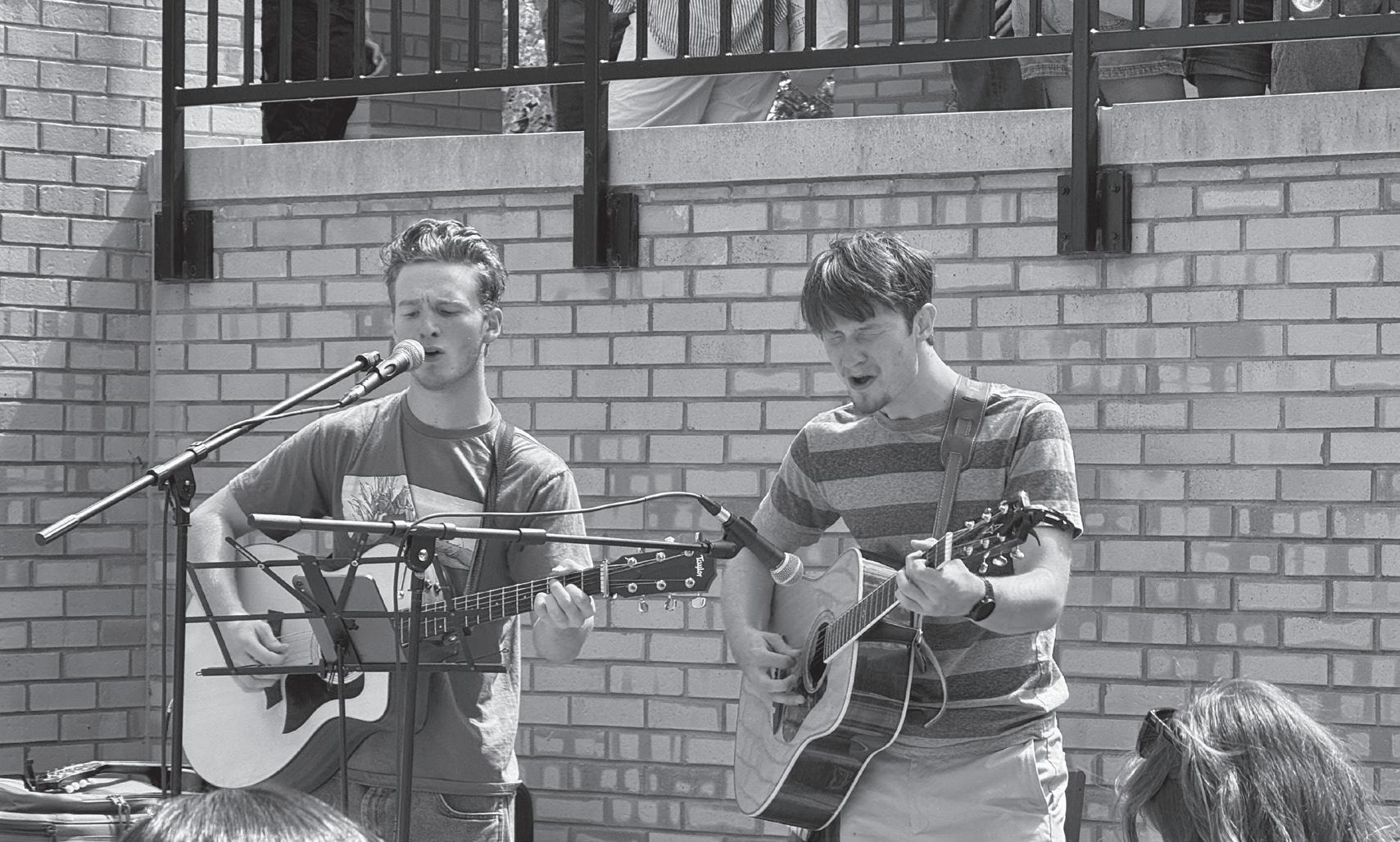
“When I’m jamming out in a band room with some guys we’ll be playing ‘Don’t Stop Believing’ and I immediately want to play some Chet Baker trumpet music; then all of a sudden one of my friends will join in with me on his trumpet, and it’s amazing to
spired by the musicians and different genres on campus, his primary musical influence is his family in Nashville — in particular, his mother, and brother Luke Bellet, who are both singer-songwriters of their own right.
“I grew up and immediate-
plays the guitar, including learning how to make chords on the fly and branch out into jazz guitar.
“Dave has a wide knowledge of how chords work, especially from jazz,” Schlueter said. “He encouraged me to start looking into jazz guitar,
because he thinks it helps with general guitar knowledge. He was encouraging me to do that over the summer, and I did a little bit of it and need to do more, because it’s really good.” Bellet said his ideal musical event on campus would comprise a songwriters circle, followed by an informal jam session, and then a prepared concert spanning multiple genres.
“The songwriters’ circle would be to ensure instead of having a formalized set of songs that you have to perform, people can rather have a sort of conversation between musicians and you can hear a lot of things that make you form other interests in other music genres, and it’s really eye-opening,” Bellet said. “Next, the jam session would have a set of songs that everyone can join in on, with a bunch of instruments. Then finally to top it off, ending the night with a really well-rounded concert, not limited to any one genre.”
Meshing multiple genres together can open students’ minds to other musical possibilities and have even more fun, Bellet said.
“Music’s not this sort of thing where you specialize and then you have to stay there, like a college major,” Bellet said. “It’s much more fluid and people should take advantage of the fact that we have so much talent on campus distributed over so many different genres, that people can learn to love switching between genres and just jamming out together.”
realities
her
Senior Daniel Doyle is the lead singer for Runaround.
Courtesy | Reva Ludwig
Bellet was inspired to play guitar by his older brother. Courtesy | Dave Bellet
Bellet performs on the patio of Kirn Residence with sophomore Karol Schlueter.
Courtesy | Dave Bellet



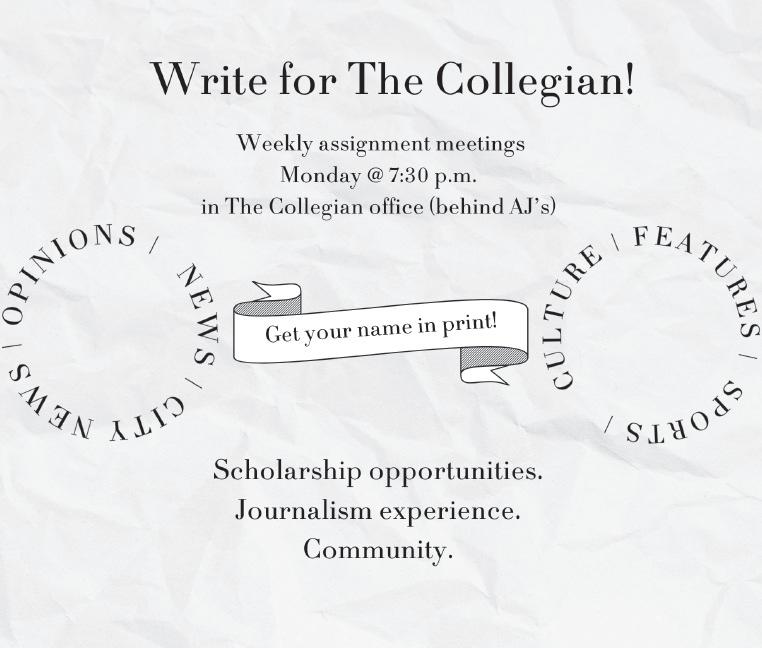
FEATURES
From The Collegian to CBS Sports: Honoring Scott Miller’s life in journalism
By Christian Papillon Assistant Editor
During his junior year at Hillsdale College, Scott Miller ’85 served as sports editor for The Collegian. Over the next 30 years, he would go on to write baseball for multiple national networks and cover 29 of the last 30 World Series.
After releasing his third baseball book, “Skipper: Why Baseball Managers Matter and Always Will,” in May, Miller died from cancer June 21.
Miller’s book was the culmination of a lifelong love for baseball and a successful career as an MLB journalist that began in the office of the Hillsdale Collegian. He became editor-in-chief of the newspaper in the spring semester of his junior year after serving as sports editor. He also served as the interim sports editor of the Hillsdale Daily News during his senior year.
Hillsdale classmate and longtime friend Kevin Shinkle ’87, who was the Collegian sports editor after Miller became editor-in-chief in fall 1985, said that while Miller was known for baseball writing, he will be remembered for much more.
“When he died, people talked about what a good baseball writer he was, but far more people talked about what a great person he was,” Shinkle said.
Shinkle said he first met Miller as a prospective student
on a trip to Hillsdale for a scholarship interview in early 1983. During the drive from the airport to Hillsdale, Miller and Shinkle bonded over sports and quickly became friends.
“People always say nice things about somebody who has died,” Shinkle said. “With Scott Miller, it was all true. He was one of the nicest, most gracious guys I’ve ever had in my stable of friends.”
Shinkle said he met with Miller again after his freshman orientation in fall 1983. Miller, who was then the Collegian sports editor, invited Shinkle to write for The Collegian.
“He said, ‘Why don’t you cover the football team?’ I was taken aback because the football team was a national powerhouse then,” Shinkle said. “So, I started doing that, and Scott was encouraging, he was fun, and he was somebody I looked up to. And he became a mentor, but he also became a really close friend.”
After graduating, Miller moved to Southern California, where he began covering high school and college sports, including San Diego State University football. In 1994, Miller got a job as the Minnesota Twins beat writer for the St. Paul Pioneer Press. He would cover the Twins for the next six seasons.
Miller then moved on to national baseball coverage, spending 14 years with the CBS Sports
website and 11 years as an analyst on MLB Network radio, where he also covered the San Diego Padres for Fox Sports San Diego.
As a member of the Baseball Writers Association of America, Miller also cast 26 ballots for the National Baseball Hall of Fame.
There will be a celebration of life in honor of Miller at Petco Park on Nov. 9. out his career,
some of his finest work.
“The book embodies Scott Miller’s career,” Shinkle said. “It’s very well-reported, it tells great stories, it opens up the world of baseball to anybody, whether you are a hardcore fan or a newer fan. It has an expertise, but also a relatability that I find great.”
In his book, Miller highlights great managers such as Terry Francona, who man-

Miller gained respect as a knowledgeable baseball writer.
According to Dr. Dan Eby ’85, an orthopedic surgeon who was Miller’s best friend since high school, Miller was such an authority on Los Angeles Dodgers two-way player Shohei Ohtani, that he was even breaking stories in Japan.
Shinkle said Miller’s book is
aged the 2004 Boston Red Sox to their first World Series win in 86 years, and Dodgers manager Dave Roberts, who led his team to World Series wins in 2020 and 2024.
Shinkle said Miller built a friendship with Roberts while writing his book. During the 2025 MLB All-Star game, Roberts paid tribute to Miller
‘To the Poor-House’ with Moorehouse
Filmmaking class celebrates 180 years of Will Carleton
By Megan Li Features Editor
For several decades, every teacher in Michigan was required to read at least one of Hillsdale alumnus Will Carleton’s poems to their students on Oct. 21. The students of the documentary filmmaking class, led by Adjunct Instructor of Documentary Journalism Buddy Moorehouse, brought that tradition back this year with a celebration of Will Carleton Day on Wednesday.
Carleton, arguably the college’s most famous alumnus, has his name on road signs, town entrances, and in the name of a charter school, but on the very campus where he studied, his story is elusive.
“Carleton was an absolute rock star in the world of poetry 150 years ago,” Moorehouse said. “Will Carleton Day used to be a huge event, both in Michigan and in Hillsdale. They had big parades and readings of his poetry and all this other stuff, and to my knowledge, nothing has ever happened at Hillsdale in the last however many decades.”
Carleton was born in Lenawee County, Michigan, in 1845 and graduated from Hillsdale College in 1869. His birthplace marker now stands near Hudson on West Carleton Road. Known for his rustic poetry and lectures, he started his own literary magazine called “Every Where.”
“Carleton wrote poetry that celebrated the everyday lives, hardships, and joys of Americans,” senior Cassandra DeVries said in her introduction of Carleton at the celebration this week. “Despite his widespread fame, Carleton never forgot his roots in Hillsdale College and even supported the college financially.”
Senior Emma Wiermann gave background to Carleton’s most famous poem, “Over the Hill to the Poor-House.”
“The poem powerfully tells the story of an elderly woman who, after a lifetime of work and caring for her family, finds herself abandoned and forced into the poor house,” Wiermann said. “It resonated in the late 19th and early 20th century as a moral appeal to recognize the dignity of older people and to emphasize the ethical duty children and families and by extension, society, have towards their elders.”
Sophomore Aubrie Wilson, freshman Nora Shull, and junior Gemma Flores then took turns reading sections of the poem aloud.
Moorehouse said Carleton’s poems are not like reading 16th-century English poetry, but are rather “common sense, homespun, and just wonderful.”
“He wasn’t just an incredible poet — he was a remarkable person, and he was Hillsdale’s own,” Moorehouse said. Every year, the students of the filmmaking class create a short documentary of Carleton. When Olivia Hajicek ’24 took the class as a student, she researched Carleton’s lesser-known sequels to “Over the Hill to the Poor-House” and “Betsey and I Are Out,” another one of Carleton’s fa-
mous works that describes a husband and wife deciding on a divorce.
“The sequels change the endings. In ‘Over the Hill From the Poor-House,’ one of the woman’s children comes from across the country to bring her home, and in ‘How Betsey and I Made Up,’ the husband and wife are reconciled and fall in love with each other again,” Hajicek said. “The sequels give us a more complete picture of Will Carleton. He had compassion for the struggles of ordinary people, but he also filled his poems with hope and even redemption. I think that alone makes him worth reading 180 years later.”
Hajicek said she is inspired by Carleton’s care for ordinary people.
“He went on to become famous, but he was always humble and never forgot where he came from,” Hajicek said. “Also, his poems are beautiful and wholesome — the kind of thing I would want to read to my own children someday.”
Professor Emeritus of English Michael Jordan said some magazine editors thought Carleton was uneducated because he used dialect in his poetry.
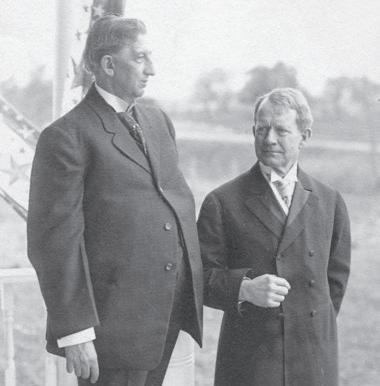
during the Stand Up to Cancer in-stadium moment.
“Everybody in the crowd and all the players and coaches wrote the name of somebody who had cancer on a card,” Shinkle said.
“And Dave Roberts had written Scott Miller’s name on his card.
That’s a great tribute.”
Eby said the book showcases not only Miller’s ability as a writer, but also his character as a person.
“The book stands for itself in talking about the changes in baseball and the changes in management style. There is good commentary on why managers are useful,” Eby said.
“I think that book also shows how he could bring people together. He was very good at relationships.”
Eby said Miller conducted extensive research while writing his book.
“The book was a labor of love,” Eby said. “He had to interview an awful lot of people, some of whom he was friends with and some of whom he became friends with.”
Shinkle said he and Miller’s shared fandom for the Tigers contributed to their friendship.
“Scott took me to my very first game at Tiger Stadium in 1983,” Shinkle said. “I remember the Tigers scored 10 runs in the first inning, and Scott was just so excited to be able to take me to that Tigers game because he knew that I loved
baseball, too.”
Shinkle said sports journalism was Miller’s lifelong passion.
“All he ever wanted to do, from the time he was probably 12 years old, was to become a baseball writer,” Shinkle said. “He had this deep, abiding passion for the Detroit Tigers and for baseball.”
Jill Simmons ’85 became friends with Miller during their freshman year.
“We had a group of friends between Olds and Simpson and we just hung out a lot,” Simmons said. “We pranked each other and just had fun.”
After graduating, Simmons said she and Miller remained close friends.
When Simmons’s grandmother was sick with cancer, Miller, who lived 400 miles away, helped her travel from Tucson, Arizona, to San Diego, California. One day, Simmons said Miller took them out to the San Diego Zoo.
“Mils was so amazing,” Simmons said. “He pushed my grandmother’s wheelchair the whole day. It was his job.” Afterward, Miller took them to a baseball game between the Los Angeles Dodgers and the San Diego Padres.
“He got her a hat and a pennant,” Simmons said. “She adored him. He was just so generous and so kind.”
“One editor actually tossed Carleton’s poems into the trash can, not realizing that Carleton was practicing a form of realism in accurately reflecting the way his rural characters spoke,” Jordan said in an email. “In ‘Over the Hill to the Poor-House,’ the old lady who speaks drops her g’s in all her gerunds. She even tells us she has not had an ‘edication,’ and then shows us by using this imaginative figurative expression: ‘I never swallowed a grammar, nor ’et a ’rithmetic.’
Carleton allegedly roomed in Jordan’s house on Fayette Street, built in 1848, as a Hillsdale student.
“The family that owned our house for about 90 years told us that the plaster wall in Carelton’s bedroom upstairs, now covered with old wallpaper, once had some of his verse written on it,” Jordan said.
A year before he died, Carleton read his poems at the Howell Opera House, the center of activity in the town of Howell in the 1800s and early 1900s, according to Moorehouse.
“He delighted the audience for two hours with the history, interpretation and recital of his various productions published and unpublished,” wrote a review published in the Livingston County Press in Howell after the talk. “Will Carleton, unlike most authors, has the faculty of making his own productions interesting. Come again.”
“I like to think that Will Carleton, wherever he is, is looking down, very happy that some students at his college, 180 years after he was born, decided to read one of his poems on the campus where he went to school,” Moorehouse said. “This was a very small and humble celebration, just like Will Carleton was a humble and wonderful person, but I think we made him proud.”
Quick Hits with Cameron Moore
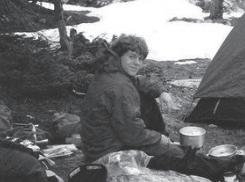
In this Quick Hits, Assistant Professor of English Cameron Moore talks Middle-earth, sailing, and Pilot G-2 0.7 blue pens.
As a child, what did you want to be when you grow up? War correspondent.
What is the best pen money can buy?
Pilot G-2 .07, blue. Perfect for grading.
How did you meet your wife and why did you fall in love with her?
Wendy and I were freshmen together at Spring Arbor, but I thought she was a sophomore because she already knew everyone on campus. We were good friends; I fell in love during senior year when I realized that in addition to being smart, kind, fun, and beautiful, she had the same vision of the good life that I did. We’ve been delighting in the adventure together ever since then.
What do you look forward to most in your workday?
of what we are reading.
What is your favorite conspiracy theory?
A couple years ago, my friends and I had a conspiracy theory night where everyone had to present a conspiracy theory and why we should believe it. I walked away half-convinced by all of them; the Phantom Time conspiracy, that the medieval years from 614-911 were fabricated, was the most fun.
What is your best piece of advice for achieving success after college?
Choose community.
What is something you’ve never done but always wanted to try?
Sailing while doing some kind of work that requires singing shanties.
What book character would you be and why?
Any hero from J.R.R. Tolkien’s legendarium; who doesn’t want to live in Middle-earth?
Compiled by Elaine Kutas Sports Editor
The moment in class where the magic happens, when all our discussion about a text leads us to realize collectively the beauty
Scott Miller graduated from Hillsdale College in 1985. Courtesy | Hillsdale College Virtue and Valor Blog
Moore camping in the Holy Cross Wilderness in Colorado during high school. Courtesy | Cameron Moore
Carleton stands with former Hillsdale College President Joseph Mauck (left to right). Courtesy | Mossey Library

WHIP from A1
“I haven’t had a bad experience not working. Obviously, the internship is such a big part of the WHIP experience and expecting to not go into the office for a few weeks is kind of daunting, but it also allows me to really explore the city and see what other opportunities are out there,” Soeleman said. “For example, we were able to go to an intern workshop and network-
ing events, which we probably wouldn’t have been able to if we were still working nine-to-five jobs.”
The furlough has given the students time to focus on their school work and explore other activities around the city, according to Mooney. “It’s honestly been a good chance to catch up and get ahead on school work,” Mooney said. “There have been plenty of things to do. Also just going around, visiting monuments, visiting all the things that there are to see in the city.”
The work the students are doing for Hillsdale in D.C. has been keeping them busy, but they have a more relaxed schedule than they did with their fulltime internships, according to Lovins.
“It’s a little bit like a weekend with an independent research project,” said Lovins.
Junior Elizabeth Gaines, an intern at the House of Representatives Judiciary Committee, used her newfound free time to get out of D.C and visit a new city.
“On the first day of the shut-

down, or maybe the second day, me and a couple of friends went to Philadelphia, so that was a fun little thing we got to do,” Gaines said. “We went to the Museum of the American Revolution, and we saw the Betsy Ross House and just walked around and saw some of the historic downtown area.”
Although furloughed employees are prohibited from working, Soeleman still stays in contact with the people from her office.
“I can’t touch any work at all, but I’m invited to hang out in the office to talk to them. A few weeks ago, they hosted a little potluck in the office, so I came in with cookies and just was able to talk to them and see how the of was holding up spite everything,” Soeleman said.
ployees who do lower bu reaucratic work and interns are not allowed to work, the responsibility to cover their work load falls onto those deemed essential, ac cording to Lovins.
harder for the people who are still at work because they don’t have all of the support staff, and there’s a much
larger burden on them right now,” Lovins said.
There seems to be no urgency for reopening the government, Lovins said, so it is difficult to gauge the duration of the furlough.
“We can’t have a good timeline of when the government’s going to reopen. They could come to a deal tomorrow, hypothetically. They’re not going to, but they could,” Lovins said. “It probably will be shut down all of next week, if I had to guess. I’ve heard some people say it’s going to be shut down until Nov. 1. So everybody has different
is not working, Gaines says the city feels different as she spends time out and about during her usual working hours instead of the hours after work.
“I would say I personally have not noticed a huge change. It’s funny, because now, I’m walking around in the middle of the day going places, and it’s hard for me to say whether it’s different now, because I would have just been in the office in the middle of the day,” Gaines said. “Also, taking the metro, I don’t really notice a huge change. But then again, that’s just because normally I would have been working.” ternship, WHIP still has a lot to offer students, according to
Compiled by Evelyn Shurtliff Collegian Freelancer
Bradley Haley is a junior English major from Gallipolis, Ohio. He is a George Washington Fellow, president of Hillsdale’s Federalist Society, and founder of an online publication called New Guard Press. His writing has been featured in The Daily Signal, The Federalist, The Daily Caller, and Crisis Magazine. In his free time, Haley enjoys playing the guitar and organ, reading G.K. Chesterton, running, and drinking good coffee.
If you could have dinner with any famous person, past or present, who would it be and why?
I would have dinner with G.K. Chesterton so I could talk with him about modern things like iPhones and Taylor Swift to get his perspective on them.
Why are you majoring in English?
When I came to Hillsdale, I was undecided between philosophy, politics, and English. But in my Great Books classes, I discovered that really all the things which I was interested in were most contained in literature. So I decided I wanted to spend my time studying great authors and
Bradley Haley Features

Campus Character
reading literature.
What has been the most formative class you have taken at Hillsdale?
Victorian and Modern Literature with Dr. Lindley was by far the most formative class for me.
Seeing the philosophic beginnings of the industrial age really changed how I see the modern world.
What is the most valuable piece of advice you have been given?
“A students work for C students, and B students work for the government.” I hope none of my professors read this, but perhaps some freshmen will ponder this when they are in the library at 1 a.m. during Hell Week.
If you won the lottery, what would you do with the money?
I would donate it to the college and tell them to expedite the construction.
If you were running for president, what would your campaign slogan
be? Don’t Be a Fundie.
What is your go-to AJ’s order?
Smashburger and fries with hot sauce and barbecue sauce on the fries.
What is your favorite hobby?
Hunting — specifically squirrel hunting in West Virginia and preparing the squirrel legs to be fried.
Who has been the most influential person in your life?
My dad and I have always had
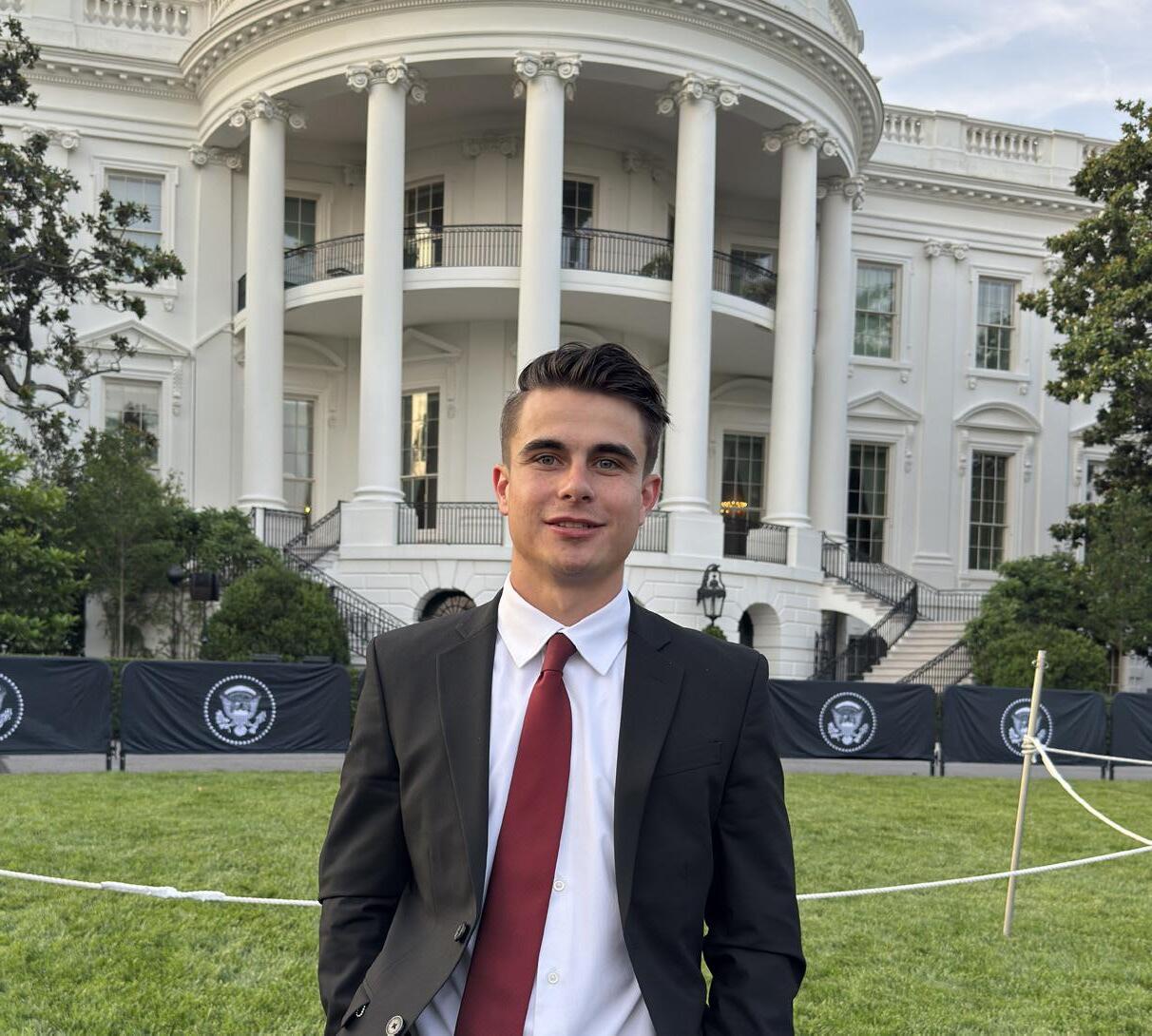
very interesting conversations about theology and politics and everything else. I would say those shaped me a good deal.
What is a book quote that you think everyone should memorize?

I think it would either be, “We have sinned and grown old and our father is younger than we,” from G.K. Chesterton, or
“You have never met a mere mortal,” from C.S. Lewis.
If you were in a reality TV show, what character stereotype would you play?
The strategist, and I’d be called Desmond.
What is the most formative group you have been a part of at Hillsdale?
I have met a lot of my closest friends at the Grotto and Catholic Society events. The Catholic Society leadership team does a really good job and hosts a lot of wonderful events. And most importantly, the Catholic Society band-
“The part of WHIP that is so valuable is the connections that you build and the people you get to meet, and I’m still able to do that really well even though I’m not in the office full time,” Mooney said. “We’re making the most of the furlough and the shutdown thing, just trying to itive and do the most that we can. we’ve
ed together to crown our rightful sovereign, Andrew Winter, at homecoming.
How would you rank the top three coffee shops in Hillsdale?
Well, I’ve only been to three, so I’d say, 1) Rough Draft, 2) Penny’s, and 3) Checker Records. I am loyal to Rough Draft though — some say I am part of the decor.
What do you think is one of Hillsdale’s most underappreciated qualities?
I think people underappreciate how good it is to be in the middle of nowhere. The fact that my car gets muddy every time I come and go from Hillsdale says a lot about Hillsdale. We get to spend four years in a relatively normal, rural town, studying under great professors and alongside incredibly intelligent peers. We all choose to come here for the education, and for the people, not because it is convenient. That means everyone is bought in, and as Nathan Furness says, locked in.
What is your favorite type of music to play?
I really enjoy
playing folk music, especially Mumford and Sons, and lately some Zach Bryan.
Haley in front of the White House.
Courtesy | Bradley Haley
Golden hour on Capitol Hill.
Courtesy | Elizabeth Gaines
The Fall 2025 WHIP class stand together in Apartment B of the Hillsdale House.
Courtesy | Elizabeth Soeleman
Soeleman poses in front of the National Gallery of Art.
Courtesy | Elizabeth Soeleman
